

The best AI tools for research papers and academic research (Literature review, grants, PDFs and more)
As our collective understanding and application of artificial intelligence (AI) continues to evolve, so too does the realm of academic research. Some people are scared by it while others are openly embracing the change.
Make no mistake, AI is here to stay!
Instead of tirelessly scrolling through hundreds of PDFs, a powerful AI tool comes to your rescue, summarizing key information in your research papers. Instead of manually combing through citations and conducting literature reviews, an AI research assistant proficiently handles these tasks.
These aren’t futuristic dreams, but today’s reality. Welcome to the transformative world of AI-powered research tools!
This blog post will dive deeper into these tools, providing a detailed review of how AI is revolutionizing academic research. We’ll look at the tools that can make your literature review process less tedious, your search for relevant papers more precise, and your overall research process more efficient and fruitful.
I know that I wish these were around during my time in academia. It can be quite confronting when trying to work out what ones you should and shouldn’t use. A new one seems to be coming out every day!
Here is everything you need to know about AI for academic research and the ones I have personally trialed on my YouTube channel.
My Top AI Tools for Researchers and Academics – Tested and Reviewed!
There are many different tools now available on the market but there are only a handful that are specifically designed with researchers and academics as their primary user.
These are my recommendations that’ll cover almost everything that you’ll want to do:
Want to find out all of the tools that you could use?
Here they are, below:
AI literature search and mapping – best AI tools for a literature review – elicit and more
Harnessing AI tools for literature reviews and mapping brings a new level of efficiency and precision to academic research. No longer do you have to spend hours looking in obscure research databases to find what you need!
AI-powered tools like Semantic Scholar and elicit.org use sophisticated search engines to quickly identify relevant papers.
They can mine key information from countless PDFs, drastically reducing research time. You can even search with semantic questions, rather than having to deal with key words etc.
With AI as your research assistant, you can navigate the vast sea of scientific research with ease, uncovering citations and focusing on academic writing. It’s a revolutionary way to take on literature reviews.
- Elicit – https://elicit.org
- Litmaps – https://www.litmaps.com
- Research rabbit – https://www.researchrabbit.ai/
- Connected Papers – https://www.connectedpapers.com/
- Supersymmetry.ai: https://www.supersymmetry.ai
- Semantic Scholar: https://www.semanticscholar.org
- Laser AI – https://laser.ai/
- Inciteful – https://inciteful.xyz/
- Scite – https://scite.ai/
- System – https://www.system.com
If you like AI tools you may want to check out this article:
- How to get ChatGPT to write an essay [The prompts you need]
AI-powered research tools and AI for academic research
AI research tools, like Concensus, offer immense benefits in scientific research. Here are the general AI-powered tools for academic research.
These AI-powered tools can efficiently summarize PDFs, extract key information, and perform AI-powered searches, and much more. Some are even working towards adding your own data base of files to ask questions from.
Tools like scite even analyze citations in depth, while AI models like ChatGPT elicit new perspectives.
The result? The research process, previously a grueling endeavor, becomes significantly streamlined, offering you time for deeper exploration and understanding. Say goodbye to traditional struggles, and hello to your new AI research assistant!
- Consensus – https://consensus.app/
- Iris AI – https://iris.ai/
- Research Buddy – https://researchbuddy.app/
- Mirror Think – https://mirrorthink.ai
AI for reading peer-reviewed papers easily
Using AI tools like Explain paper and Humata can significantly enhance your engagement with peer-reviewed papers. I always used to skip over the details of the papers because I had reached saturation point with the information coming in.
These AI-powered research tools provide succinct summaries, saving you from sifting through extensive PDFs – no more boring nights trying to figure out which papers are the most important ones for you to read!
They not only facilitate efficient literature reviews by presenting key information, but also find overlooked insights.
With AI, deciphering complex citations and accelerating research has never been easier.
- Aetherbrain – https://aetherbrain.ai
- Explain Paper – https://www.explainpaper.com
- Chat PDF – https://www.chatpdf.com
- Humata – https://www.humata.ai/
- Lateral AI – https://www.lateral.io/
- Paper Brain – https://www.paperbrain.study/
- Scholarcy – https://www.scholarcy.com/
- SciSpace Copilot – https://typeset.io/
- Unriddle – https://www.unriddle.ai/
- Sharly.ai – https://www.sharly.ai/
- Open Read – https://www.openread.academy
AI for scientific writing and research papers
In the ever-evolving realm of academic research, AI tools are increasingly taking center stage.
Enter Paper Wizard, Jenny.AI, and Wisio – these groundbreaking platforms are set to revolutionize the way we approach scientific writing.
Together, these AI tools are pioneering a new era of efficient, streamlined scientific writing.
- Jenny.AI – https://jenni.ai/ (20% off with code ANDY20)
- Yomu – https://www.yomu.ai
- Wisio – https://www.wisio.app
AI academic editing tools
In the realm of scientific writing and editing, artificial intelligence (AI) tools are making a world of difference, offering precision and efficiency like never before. Consider tools such as Paper Pal, Writefull, and Trinka.
Together, these tools usher in a new era of scientific writing, where AI is your dedicated partner in the quest for impeccable composition.
- PaperPal – https://paperpal.com/
- Writefull – https://www.writefull.com/
- Trinka – https://www.trinka.ai/
AI tools for grant writing
In the challenging realm of science grant writing, two innovative AI tools are making waves: Granted AI and Grantable.
These platforms are game-changers, leveraging the power of artificial intelligence to streamline and enhance the grant application process.
Granted AI, an intelligent tool, uses AI algorithms to simplify the process of finding, applying, and managing grants. Meanwhile, Grantable offers a platform that automates and organizes grant application processes, making it easier than ever to secure funding.
Together, these tools are transforming the way we approach grant writing, using the power of AI to turn a complex, often arduous task into a more manageable, efficient, and successful endeavor.
- Granted AI – https://grantedai.com/
- Grantable – https://grantable.co/
Best free AI research tools
There are many different tools online that are emerging for researchers to be able to streamline their research processes. There’s no need for convience to come at a massive cost and break the bank.
The best free ones at time of writing are:
- Elicit – https://elicit.org
- Connected Papers – https://www.connectedpapers.com/
- Litmaps – https://www.litmaps.com ( 10% off Pro subscription using the code “STAPLETON” )
- Consensus – https://consensus.app/
Wrapping up
The integration of artificial intelligence in the world of academic research is nothing short of revolutionary.
With the array of AI tools we’ve explored today – from research and mapping, literature review, peer-reviewed papers reading, scientific writing, to academic editing and grant writing – the landscape of research is significantly transformed.
The advantages that AI-powered research tools bring to the table – efficiency, precision, time saving, and a more streamlined process – cannot be overstated.
These AI research tools aren’t just about convenience; they are transforming the way we conduct and comprehend research.
They liberate researchers from the clutches of tedium and overwhelm, allowing for more space for deep exploration, innovative thinking, and in-depth comprehension.
Whether you’re an experienced academic researcher or a student just starting out, these tools provide indispensable aid in your research journey.
And with a suite of free AI tools also available, there is no reason to not explore and embrace this AI revolution in academic research.
We are on the precipice of a new era of academic research, one where AI and human ingenuity work in tandem for richer, more profound scientific exploration. The future of research is here, and it is smart, efficient, and AI-powered.
Before we get too excited however, let us remember that AI tools are meant to be our assistants, not our masters. As we engage with these advanced technologies, let’s not lose sight of the human intellect, intuition, and imagination that form the heart of all meaningful research. Happy researching!
Thank you to Ivan Aguilar – Ph.D. Student at SFU (Simon Fraser University), for starting this list for me!

Dr Andrew Stapleton has a Masters and PhD in Chemistry from the UK and Australia. He has many years of research experience and has worked as a Postdoctoral Fellow and Associate at a number of Universities. Although having secured funding for his own research, he left academia to help others with his YouTube channel all about the inner workings of academia and how to make it work for you.
Thank you for visiting Academia Insider.
We are here to help you navigate Academia as painlessly as possible. We are supported by our readers and by visiting you are helping us earn a small amount through ads and affiliate revenue - Thank you!

2024 © Academia Insider


10 Best AI Research Paper Writing Tools for 2024 and 2025
As we look ahead to end of 2024 and forward to 2025, AI tools are set to revolutionize research paper writing by offering powerful features to enhance structure, clarity, and originality. This article explores the top 10 AI writing assistants designed to simplify the research paper writing process for students and academics:
Research Rabbit
Semantic Scholar
Quick Comparison
These AI tools offer a range of features to enhance research paper writing, including literature review assistance, citation management, data analysis, plagiarism checking, and AI-powered writing assistance. By leveraging the power of AI, students and researchers can improve the quality and efficiency of their research paper writing process.
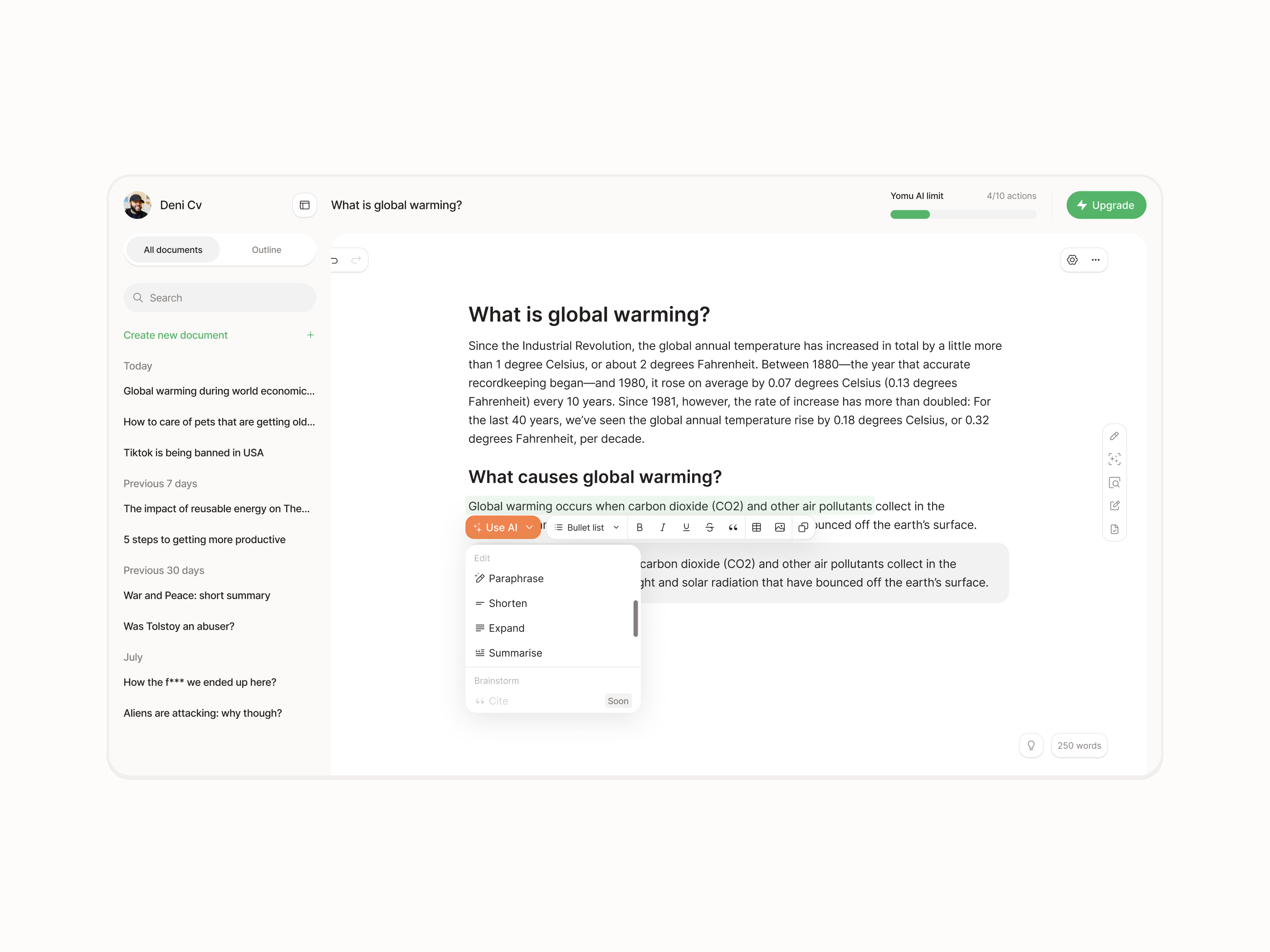
Key Features
Literature Review Assistance : Yomu AI helps researchers find relevant papers and summarize key findings, saving time in the initial research phase.
Citation Management : The tool automatically generates citations in various formats, ensuring accuracy and consistency throughout the paper.
AI Writing Assistant : Yomu AI can help generate paragraphs, suggest improvements, and even assist in structuring the paper according to academic standards.
Plagiarism Check : An integrated plagiarism checker ensures the originality of the work.
Data Analysis Support : While not a full-fledged data analysis tool, Yomu AI can assist in interpreting results and suggesting appropriate statistical methods.
Yomu AI significantly reduces the time spent on research paper writing while improving the overall quality of the work. Its user-friendly interface and comprehensive feature set make it an excellent choice for both novice and experienced researchers.
2. Scite.ai
Scite.ai is an AI-powered platform that revolutionizes the way researchers interact with scientific literature.
Smart Citations : Scite.ai provides context for citations, showing how the cited work has been referenced by other papers.
Literature Discovery : The tool helps researchers find relevant papers based on their current research interests.
Citation Validation : Scite.ai checks if citations actually support the claims made in the paper.
Scite.ai enhances the literature review process by providing deeper insights into the relevance and impact of cited works, leading to more robust and well-supported research papers.
3. Sourcely
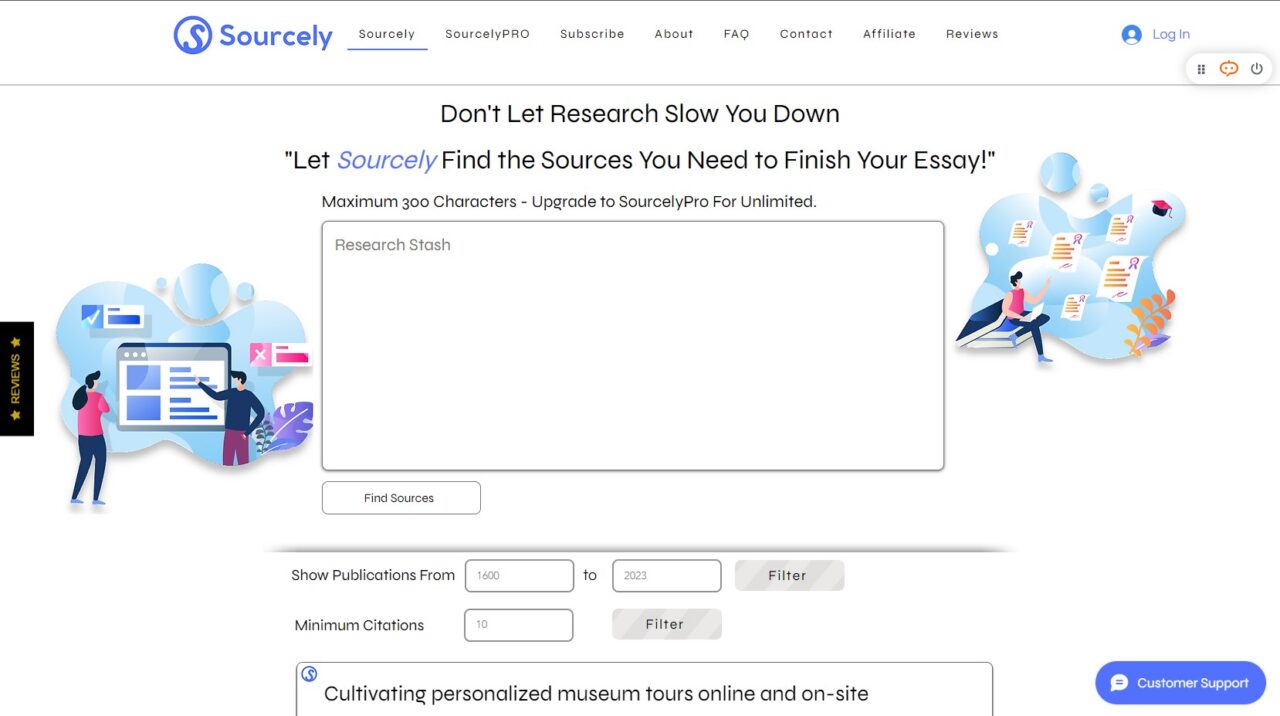
Sourcely.net is an AI-powered research assistant designed to streamline the academic research process and enhance source discovery.
Access to Vast Database : Sourcely.net provides access to over 200 million research papers, ensuring comprehensive coverage of various academic fields
Precise Search Filters : Users can refine their search results using advanced filters, including minimum citations, keywords, and article type
PDF Downloads : Sourcely.net allows users to easily download PDFs of research papers, facilitating offline reading and annotation
AI-Powered Recommendations : The platform uses artificial intelligence to understand research needs and deliver personalized source recommendations
Integration with Yomu AI : Sourcely.net seamlessly integrates with Yomu AI for real-time feedback and efficient writing tools.
Sourcely.net significantly enhances the research process by providing a user-friendly interface for discovering relevant sources, saving time, and improving the overall quality of academic work. Its AI-powered features and vast database make it an invaluable tool for students, researchers, and academics alike.
4. Research Rabbit
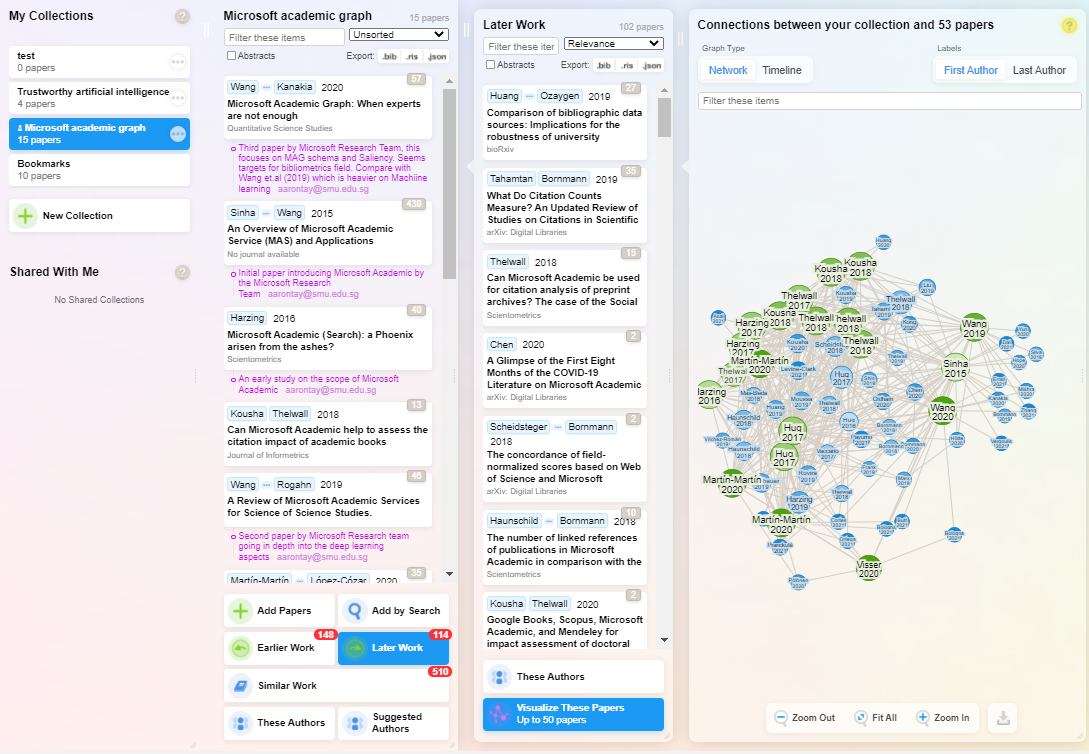
ResearchRabbit is an AI-powered literature mapping tool that helps researchers discover relevant papers and visualize connections between studies.
Literature Mapping : The tool creates visual maps of research papers, showing connections and relationships between studies.
Personalized Recommendations : ResearchRabbit suggests relevant papers based on the user's research interests.
Collaboration Features : Researchers can share collections and collaborate on literature reviews.
ResearchRabbit enhances the literature review process by providing a visual and intuitive way to explore research fields, leading to more comprehensive and well-connected research papers.
5. Writefull
Writefull is an AI-powered writing assistant specifically designed for academic and scientific writing.
Language Enhancement : Writefull provides suggestions to improve academic language usage and style.
Title and Abstract Generator : The tool can help generate compelling titles and abstracts for research papers.
Figure and Table Caption Suggestions : Writefull assists in creating clear and informative captions for figures and tables.
Writefull helps researchers improve the clarity and professionalism of their writing, ensuring that research papers meet high academic standards.
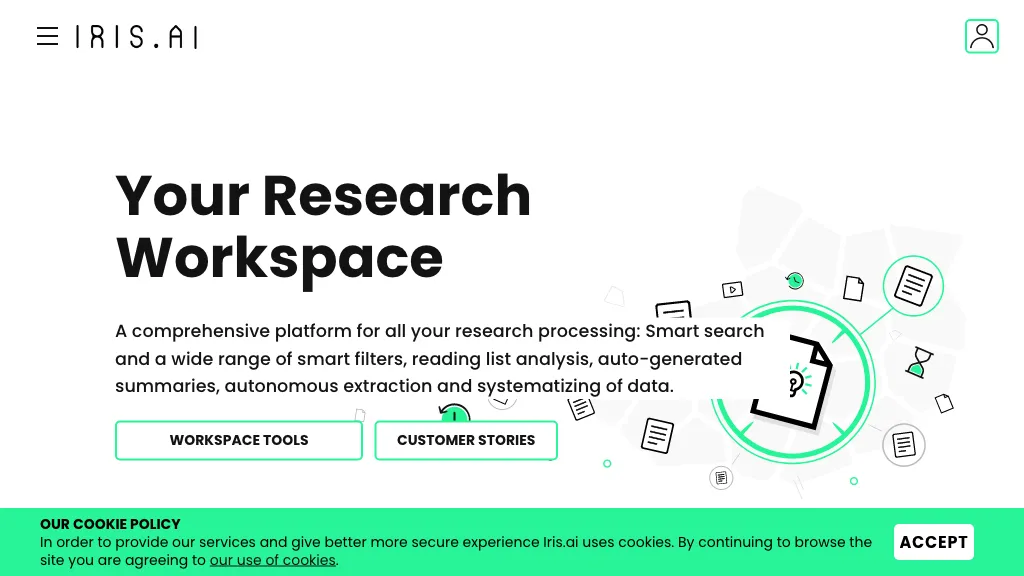
Iris.ai is an AI-powered research assistant that helps researchers navigate vast amounts of scientific literature.
Automated Literature Review : Iris.ai can analyze a research paper or project description and suggest relevant literature.
Concept Extraction : The tool identifies key concepts in scientific texts, aiding in understanding and summarization.
Research Map Generation : Iris.ai creates visual maps of research fields, helping researchers identify gaps and opportunities.
Iris.ai significantly speeds up the literature review process and helps researchers gain a broader understanding of their field, leading to more comprehensive and innovative research papers.
User Feedback and Academic Focus
Jenni AI is designed for students, researchers, and academics, with a user-friendly interface and academic focus. The tool offers flexible accessibility and pricing, making it an ideal solution for those seeking to elevate their writing skills and produce high-quality academic content.
Jenni AI's features and capabilities make it an excellent choice for those looking to improve their writing efficiency and quality. With its AI-powered language enhancement features and proofreading capabilities, Jenni AI is a valuable tool for academic writing.
7. Semantic Scholar
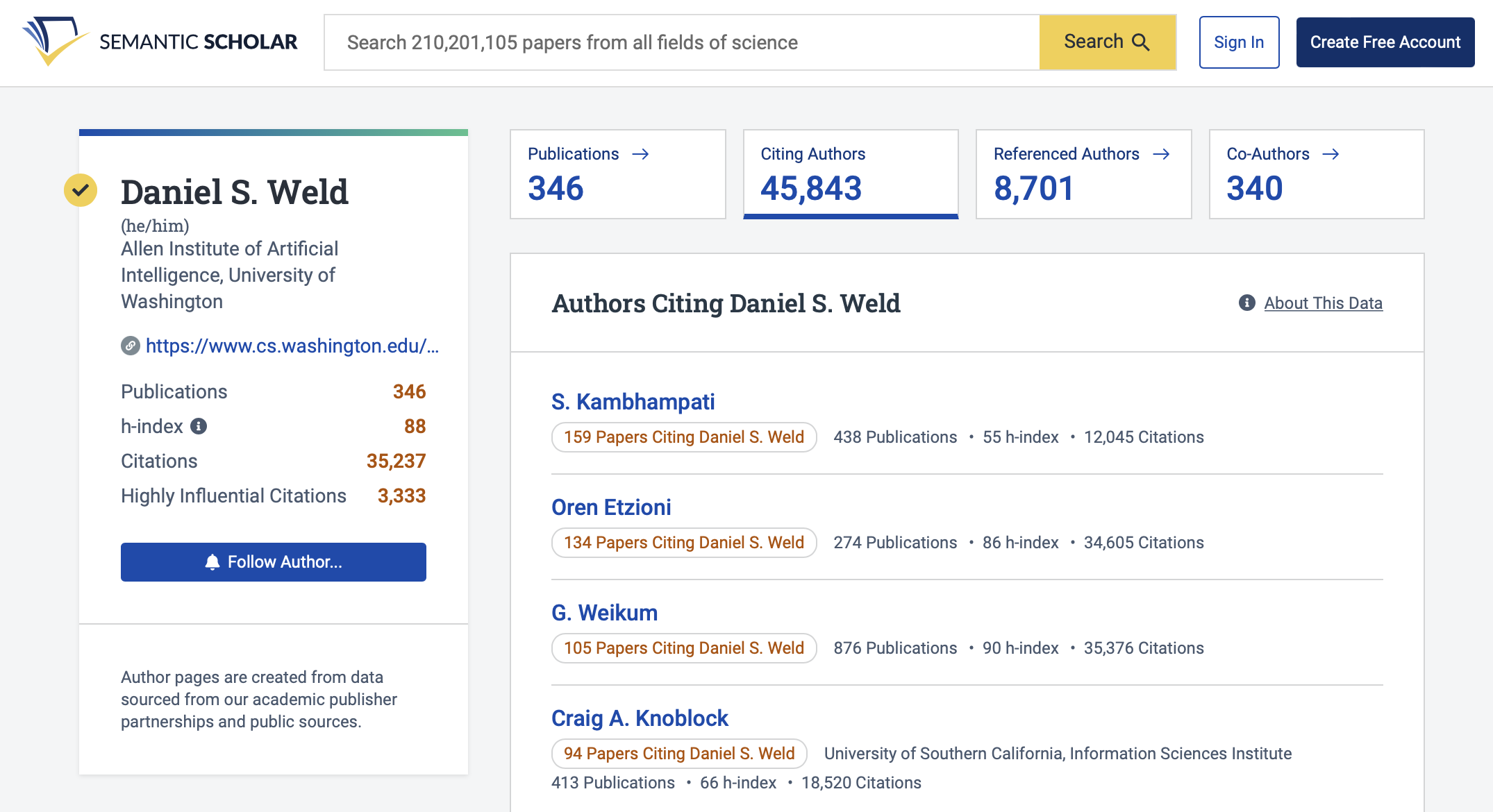
Semantic Scholar is an AI-powered research tool that helps researchers discover and understand scientific literature.
Intelligent Search : The tool uses AI to understand the meaning behind search queries, providing more relevant results.
Paper Summaries : Semantic Scholar generates concise summaries of research papers, highlighting key findings.
Citation Analysis : The tool provides insights into the impact and influence of papers based on citation data.
Semantic Scholar enhances the literature review process by providing more relevant search results and deeper insights into the impact of research papers.
sbb-itb-1831901
8. trinka ai.
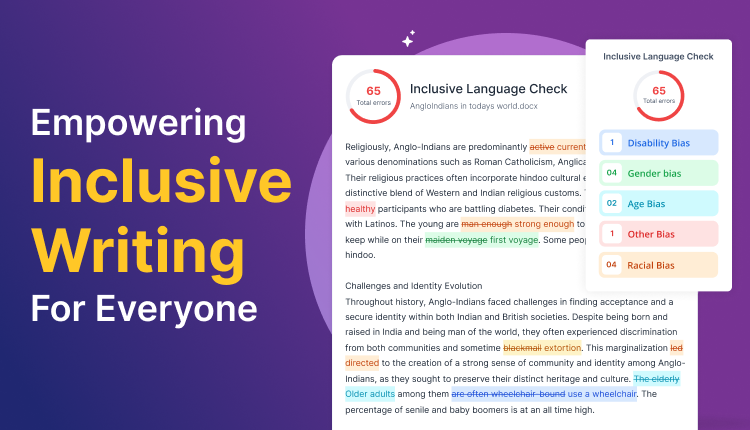
Trinka AI is an AI-powered writing assistant specifically designed for academic and technical writing.
Grammar and Style Checking : Trinka AI provides suggestions to improve grammar, punctuation, and academic writing style.
Discipline-Specific Suggestions : The tool offers writing suggestions tailored to specific academic disciplines.
Consistency Checker : Trinka AI ensures consistency in terminology and formatting throughout the paper.
Trinka AI helps researchers improve the clarity and professionalism of their writing, ensuring that research papers meet the specific requirements of their academic discipline.
9. PaperPal
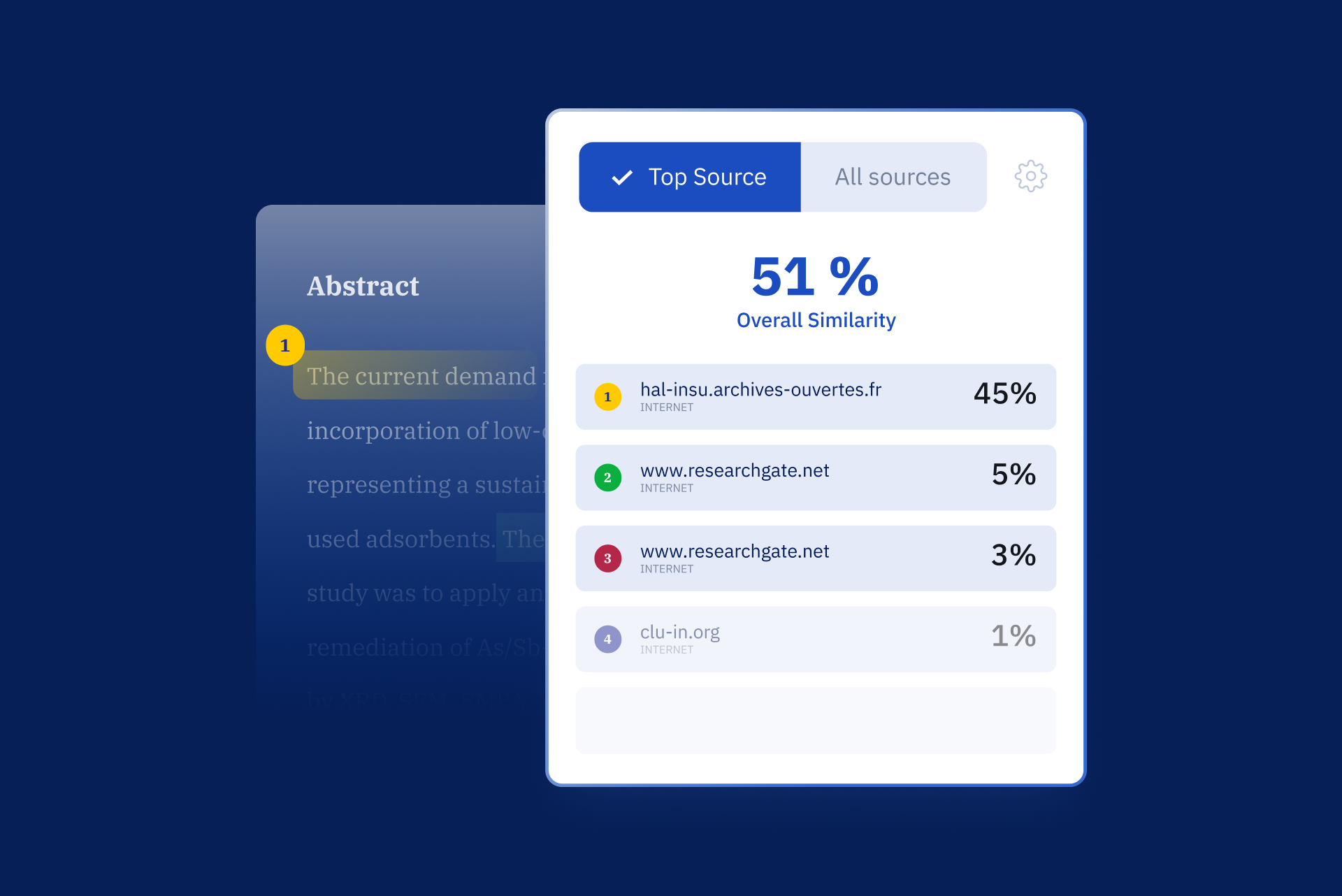
Paperpal is an AI-powered writing assistant designed to help researchers improve the quality of their manuscripts.
Language Polishing : Paperpal provides suggestions to enhance the clarity and fluency of academic writing.
Journal-Specific Formatting : The tool can format papers according to the requirements of specific journals.
Reference Checker : Paperpal ensures that all citations in the text have corresponding entries in the reference list.
Paperpal helps researchers prepare publication-ready manuscripts, increasing the chances of acceptance in academic journals.
10. Grammarly
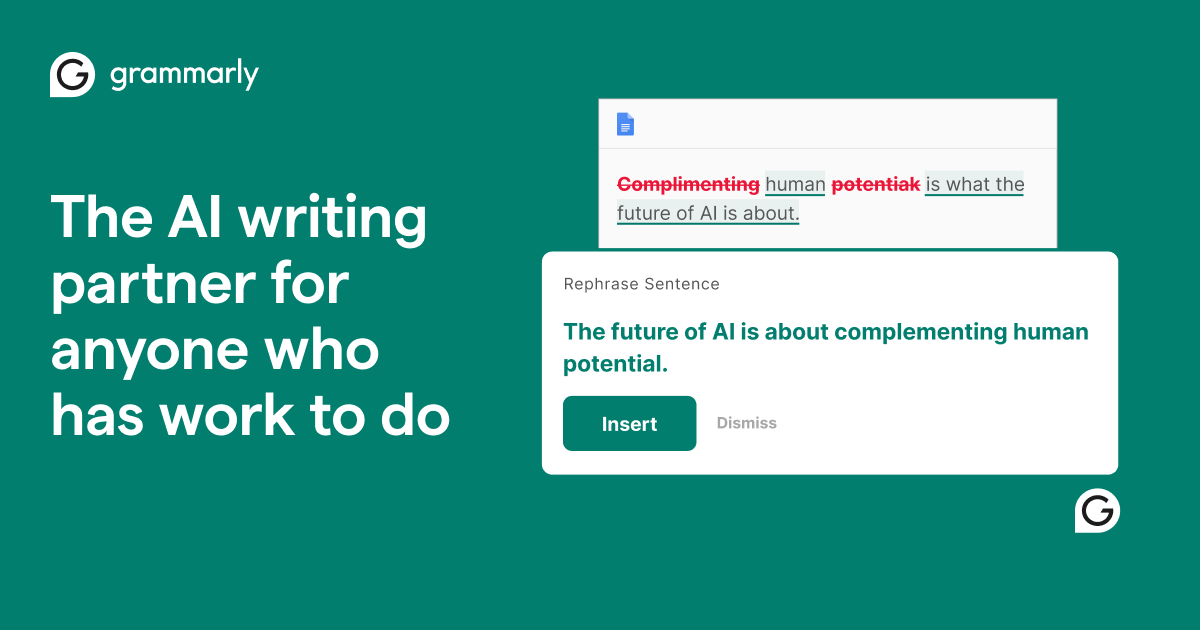
While not specifically designed for academic writing, Grammarly's AI-powered writing assistant can be a valuable tool for research paper writing.
Advanced Grammar Checking : Grammarly provides comprehensive grammar, spelling, and punctuation checks.
Style Suggestions : The tool offers suggestions to improve clarity and engagement in writing.
Plagiarism Checker : Grammarly includes a plagiarism checker to ensure the originality of the work.
Grammarly helps researchers improve the overall quality of their writing, ensuring that research papers are clear, engaging, and free of grammatical errors.
In conclusion, these AI-powered tools are set to transform the research paper writing process in 2024 and 2025. By leveraging these technologies, researchers can significantly improve the efficiency and quality of their work, leading to more impactful and successful research papers.
Related posts
- Boost Your Writing with AI: Discover the Best AI Essay Writers and Tools with Citations
- AI Writing Aid: Enhancing Academic Papers
- Leveraging AI for Enhanced Research Paper Writing
- Best Writing Assistant for Overcoming Writer's Block
The 11 best AI tools for academic writing
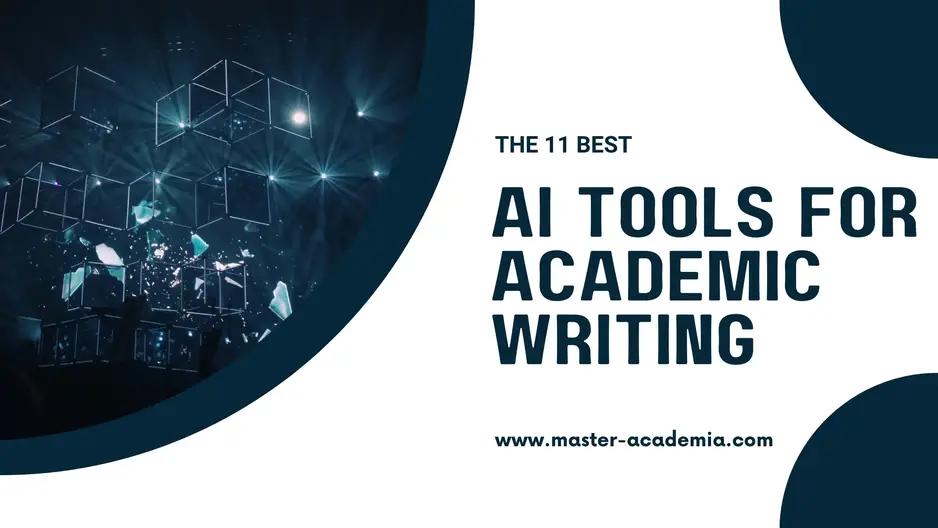
By leveraging the power of the right AI tool, you can significantly improve the clarity, efficiency, and overall quality of your academic writing. In this guide, we reviewed and ranked 11 popular AI tools for academic writing , along with our top 3 choices, so that you can pick the best one.
What are the best AI tools for academic writing?
With the rise of AI tools, academic writing is undergoing a remarkable transformation. The emergence of new AI-powered tools has revolutionized the way researchers, scholars, and students approach their writing tasks.
Having to use multiple tools for different purposes can be frustrating. Therefore, comprehensive testing was conducted on AI tools to assess their all-encompassing capabilities.
Here are Master Academia’s top picks for the best AI tools for academic writing in 2023:
Trinka takes into account the specific research subjects, ensuring that the writing style, word choice, and tone align with disciplinary standards and scientific conventions.
Key Features:
You can use the basic version of Trinka for free, which includes access to all features but with a monthly word limit of 5000 words. The pricing for Trinka’s premium plan starts at $6.67 per month with annual billing, which is extremely affordable.
Genei streamlines the academic writing process by utilizing AI-generated summaries and note-taking shortcuts, extracting information from academic articles.
For those heavily reliant on literature reviews in their academic writing, Genei proves to be a gamechanger.
3. Quil lBot
With QuillBot ‘s all-in-one Co-Writer, you can access paraphrasing, summarizing, citation creation, and essay writing tools in a single location.
In simple terms, QuillBot’s AI will collaborate with you to generate effective rephrasing. You have a lot of control as you can compare outputs from all seven available modes to choose the most suitable paraphrase.
With the premium plan, you gain access to full functionality, including unlimited word paraphrasing, summarizing up to 6000 words, faster processing, advanced grammar features, tone detection, and more. The premium plan is priced at $19.95 per month or $8.33 per month when paid annually.
4. Writefull
With additional AI widgets like the Abstract Generator, Academizer, Paraphraser, and Title Generator, it provides inspiration and assistance for academic writers.
Writefull can be used with limited functionality for free. Its Premium Plan offers unlimited use of all features at a cost of $15.37 per month.
5. Grammarly
Grammarly stands out among other AI tools by having a widespread and popular institutional license, which universities readily embrace.
Grammarly’s popularity in the academic community can be attributed to its support for citation style formatting and robust plagiarism detection, making it a valuable tool for academic writing.
The business account may not be of interest to students or researchers. However, universities can opt for Grammarly for Education, which provides licenses for free premium plans to students and staff.
6. Wordtune
Efficient Paraphrasing Tool ($9.99/mo)
The tool itself proclaims that it has gained the trust of students and researchers at renowned universities.
7. Paperpal
Paperpal, developed by Researcher.life, is a specialized AI tool designed for researchers and academic writers, leveraging the expertise gained from editing numerous manuscripts by professional editors.
Available as Paperpal for Word, Web, and Manuscript, this comprehensive tool also checks for structural and technical inconsistencies in your writing.
8. Sourcely
By analyzing text and identifying key themes, Sourcely searches through a vast data set to locate relevant and reliable sources, providing academic writers with the information needed to support their work.
Sourcely offers great affordability with a price of $5.99 per month or $36.99 per year. While it may have fewer features compared to other academic writing tools, its lower price point still makes it a valuable and useful tool for academic writing.
Rytr is a text-generating AI tool. Depending on the purpose, academics can find it useful for selecting from multiple languages and tones of voice, as well as rewording and shortening text.
Alternatively, the Unlimited plan is available at $29 per month or $290 per year. These different pricing tiers cater to the diverse needs of users, ensuring they can find the plan that best suits their requirements.
10. Writesonic
Upon generating a paragraph, Writesonic provides three different versions for you to choose from. It allows you to select the best option or make edits and revisions using the various variations.
11. TextCortex
TextCortex is an AI tool which can condense long texts into concise summaries, capturing the essential points.
Summary and Top Picks
The landscape of AI writing tools is continuously evolving, witnessing the introduction of new tools regularly. However, not all these tools are equally suitable for academic writing, as their effectiveness depends on your specific goals and requirements.
Master Academia
Get new content delivered directly to your inbox, how to benefit from chatgpt as an academic, 38 common academic job interview questions (+ powerful answers), related articles, a guide to industry-funded research: types, examples & getting started, the best online courses for phd researchers in 2024, 25 short graduation quotes: inspiration in four words or less, how to harness theoretical and conceptual frameworks for groundbreaking research.

Top 7 AI Tools for Research 2024

Table of Contents
There was a time when AI tools for research were a rarity. But that’s no longer the case. Niche-specific AI tools are becoming the new norm, and AI tools for research are an integral part of this trend. Designed specifically for researchers, students, and academics, AI research tools can now help you with literature review, data analysis, academic writing, automating tedious tasks and checks and more. Several journals and institutions now also allow the use of AI tools, with proper acknowledgement.
But here’s the thing, you can’t just pick the best AI tool for research and expect it to handle all phases of your research workflow. It’s never a one-size-fits-all deal. You need to be smart about it, analyzing what’s out there and choosing tools that are relevant to your research needs, whether they’re free or paid.
So, how do you navigate this AI jungle and choose the best AI tools for research ? We’ve got you covered. Here are our top 7 picks that will transform your research journey.
Disclaimer: This article is based on independent research and is intended to provide an unbiased comparison of various AI writing tools, including our own. While we strive to present accurate and up-to-date information, features, and pricing, we recommend checking directly with the respective companies for the latest details, as offerings may change over time. Additionally, any opinions expressed here reflect the author’s perspective and may not represent the official stance of the companies/tools discussed.
Paperpal
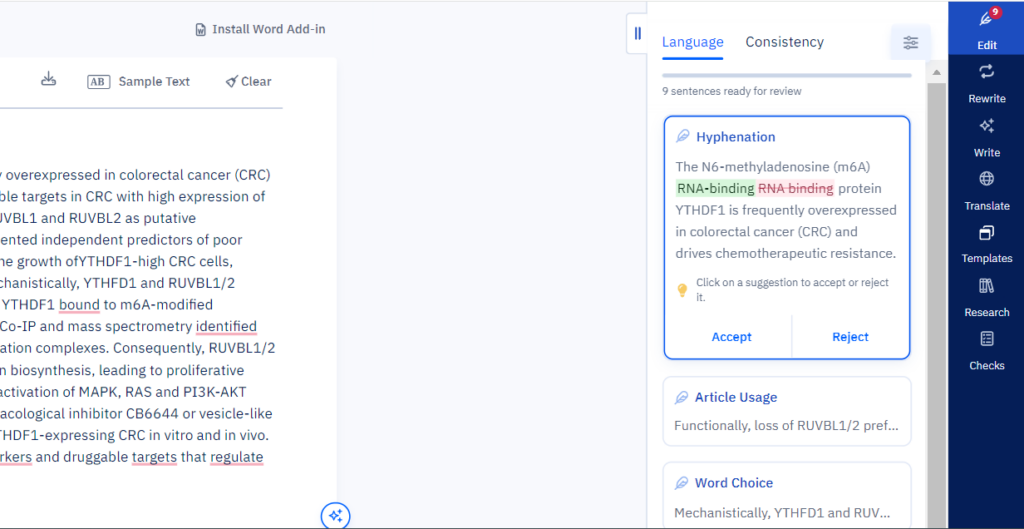
Paperpal is an all-in-one AI research and writing assistant that helps you edit, write, search, cite and submit with confidence – all at one place. Paperpal is trained on millions of scholarly articles, 22+ years of STM expertise and 2.5 million hours of editorial expertise. This enables it to understand and preserve the academic context, ensuring that your text aligns with academic writing conventions. Unlike other AI research tools that require prompts to generate the desired output, Paperpal delivers precise results without the need for detailed prompting.
- In-depth Language Checks: Paperpal provides 200+ free language suggestions based on scientific contexts, while retaining domain-specific terminology, scientific jargon, and non-English words
- In-built Search: Get science-backed answers with verified citations to your questions from over 250 + million research articles across all key disciplines. You can also save relevant articles to your Citation Library, which helps you to research, write, and cite on-the go
- Citation Generator: Generate unlimited citations in APA, MLA, Chicago and 10,000+ styles for your references
- Predictive Writing: Add a starting sentence of over 10 words, and Paperpal’s Write will offer suggestions based on context, custom instructions, or pre-set writing prompts. With Paperpal Write, you can quickly create a first draft, expand on existing content, write a counterargument, and much more
- Plagiarism Checker: Paperpal checks your paper for similarity against a database of 99 billion online webpages and provides you with a free similarity score. You can also choose the detailed plagiarism report with color-coded results and side-by-side comparisons to help you address actionable items, cite overlooked sources, and avoid accidental plagiarism
- Academic Translation: Paperpal leverages DeepL to provide accurate, high-quality translation for 30+ language pairs without changing the context or meaning
- Academic Consistency Checks: Paperpal’s consistency checks ensure style uniformity in the presentation of p-values, symbols, and statistics
- Generative AI Writing Templates: Generate outlines and titles, create abstracts, summaries, study highlights, or craft powerful emails to journals in a click – and without the need of writing extensive prompts
- Rewrite: Accurate paraphrasing and instant word reduction up to 20% to help you meet journal prescribed word counts. Paperpal also ensures a formal academic tone and retains the meaning of your work in the output
- Submission Readiness : – Paperpal offers 30+ language and technical compliance pre-submission checks to boost your manuscript’s chance of acceptance
- AI Review: Instant, targeted advice on your draft to identify logical gaps and improve flow and readability before submission
- Human Editing: Get a professional human editor to review your manuscript to enhance quality, ensuring it meets high academic standards
Paperpal – Pros and Cons
Paperpal – Pricing Plans
Paperpal provides Free and Paid plans with access to the following features tailored to enhance academic writing. You get access to the following features:
- Language suggestions – 200/month
- Rewrite (Paraphrase, Trim, and more)
- Research (Search and Cite)
- Templates to kickstart writing
- Predictive Writing
- Translate
- Generate unlimited citations
- Check plagiarism for free up to 7,000 words
- Free submission readiness report
Paperpal’s Prime plan unlocks unlimited access to all the free features, plus consistency checks and 10,000 words/month of plagiarism checks at just US$25/month, US$55/quarter or US$139 per year.
R Discovery
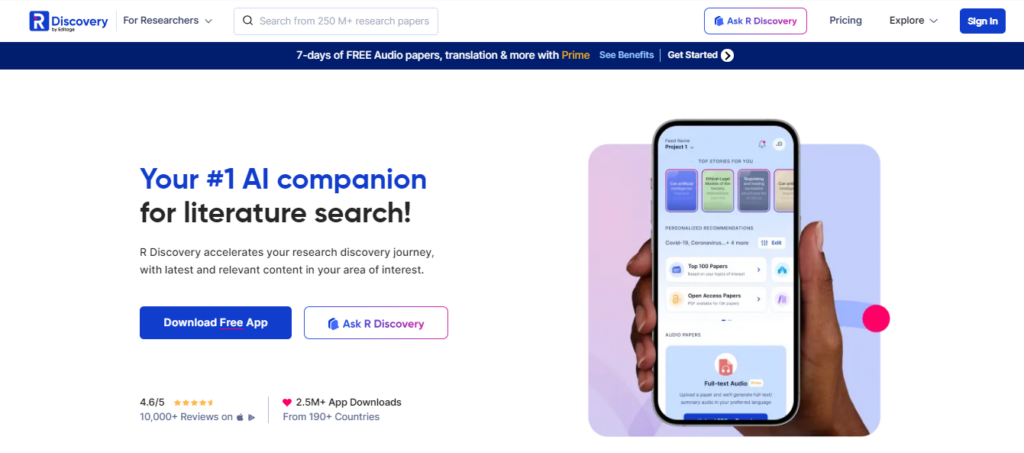
R Discovery is a literature search and research reading platform that simplifies your journey to find and read the most relevant research papers. It provides personalized reading recommendations based on users’ interests from 250M+ scholarly articles, 32K+ journals, 40M+ open access articles, and 150M+ peer-reviewed articles, as well as preprints, patents, conferences and seminars. This AI research tool accelerates your literature search and optimizes research reading with features like audio papers, translation, curated feeds, and more, making it one of the top-rated AI tools for literature review.
- Personalized Recommendations: Get personalized recommendations based on your interests and topics from the latest, most relevant research on the web, including articles without keywords. Get daily research alerts so you never miss out on important updates.
- Audio Papers: Read and listen to research papers text and audio simultaneously. Enjoy full-text papers and audio summaries in your native language or get an audio playlist of the most cited papers.
- Paper Translations: Break the language barrier in your research by choosing from over 30 languages to translate and read research papers on R Discovery.
- Ask R Discovery: Understand complex research faster by asking your research question and getting factual answers backed by citations from over 250 million research papers.
- Reference Manager Sync: Organize your references with an easy auto sync between your reading library on R Discovery and your Zotero or Mendeley account.
- Research In Shorts (App Only): Quickly evaluate a paper’s relevance and grasp its main points in under two minutes, combining the advantages of skimming without the drawbacks.
- Collaboration and Multi Projects (App Only): Access and share research recommendations by a community of peers in your field; these lists allow for quick, easy, relevant research discovery and better literature reading.
R Discovery – Pros and Cons
R Discovery – Pricing Plans
R Discovery offers the following pricing plans:
Free Version: Users can access the platform for free, which includes basic features such as personalized reading feeds, daily research recommendations, and access to a vast database of research articles.
R Discovery Prime: This subscription-based plan offers unlimited access to premium features, including:
- Institutional access to paywalled journal articles
- New research alerts
- Audio papers
- AI translation
- Reference manager sync
- Collaborative reading lists
- Automatic library sync with reference managers
The R Discovery Prime subscription is available for $3 per month or $25 per year.
Mind the Graph

Mind the Graph is an online scientific illustration tool tailored for researchers, educators, and students to create visually stunning scientific graphics. With 75,000+ accurate scientific figures, this AI tool for research is ideal to visualize research for conferences, speeches, papers, classes, and much more. Mind the Graph stands out by providing detailed and precise illustrations, ensuring your scientific visuals are both impactful and accurate.
- Science Figures, Graphical Abstracts, and Infographics – Access over 75,000 scientifically accurate illustrations across 80+ popular fields, all for free.
- Templates – Save time with 300+ pre-made templates designed by science professionals for fields such as Medical, Biology, Molecular, and more.
- Customizable Graphical Abstracts – Enhance your research publications with visual representations. Free users can share publicly with a watermark.
- Drag and Drop – Easily select and manage illustrations, text, and templates with a simple drag-and-drop interface.
- On-demand Illustrations – Request custom illustrations if you can’t find exactly what you need.
- Online Platform – Access and edit your creations anytime, anywhere.
- Pre-made Resources – Customize pre-made templates and customize them with your own colors, text, and more to save time.
- Multiple Sizing Options – Ready-to-go templates in all popular sizes for various uses.
Mind the Graph – Pros and Cons
Mind the Graph – Pricing Plans
Mind the Graph offers three pricing plans:
- Starter Plan: This plan provides limited access to infographics and templates, making it suitable for those new to the platform or with minimal design needs.
- Student Plan: Priced at $5 per month, this plan offers access to a wider range of templates and illustrations, making it suitable for regular users who need to create more complex infographics.
- Researcher Plan: At $25 per month, this plan offers full access to all features, including advanced design tools and priority support. This plan is ideal for professionals and teams who require comprehensive design capabilities and faster response times.
Additionally, Mind the Graph offers a special service plan designed for academic and industry teams with advanced and personalized resource needs.
Scholarcy
Scholarcy is an AI tool for scientific research that simplifies the reading and engagement process with research articles, reports, and documents. It tackles the challenge of keeping up with the vast amount of new research by summarizing lengthy articles into concise sections, making it easier to grasp essential information.
Scholarcy highlights key elements such as study participants, data analyses, main findings, and limitations, and creates summary flashcards that link to open-access sources. It also offers a browser extension and a subscription-based personalized research library, making it a valuable resource for researchers, students, journalists, and policy analysts.
Features
- Suggests Background Reading: Scholarcy generates a list of background reading to help you quickly get up to speed in a new field. Also, it highlights terms and abbreviations in the text, making it easy to refer to them while you read.
- Highlights Important Points: Scholarcy’s Robo-Highlighter™ automatically identifies and highlights key phrases and significant contributions in academic papers. This advanced AI eliminates the need for manual highlighting, as it understands the structure of academic writing and pinpoints important points effectively.
- Creates a Referenced Summary: Scholarcy summarizes entire papers with references, rewriting statements in the third person to facilitate correct citation in reports, essays, or theses. The summarization process is fully customizable, allowing you to choose the number of words, level of highlighting, and degree of language variation.
- Finds the References: Scholarcy locates open-access PDFs from sources like Google Scholar and arXiv, using the UnPaywall API for assistance. It also allows you to download the entire bibliography in BibTex or .RIS format, making it easy to import references into your preferred reference management tool.
- Extracts Tables and Figures: Scholarcy identifies tables in PDFs or Word documents and enables you to download them in Excel format for further analysis. It also provides thumbnails of each figure, cross-referenced in the text, allowing you to quickly jump to the corresponding figure while reading.
Scholarcy – Pros and Cons
Scholarcy – Pricing Plans
Scholarcy offers Free and Scholarcy Plus priced at $45/year. The Scholarcy Plus plan offers enhanced features including the ability to generate detailed summaries, save flashcards, take notes, highlight and edit text, and organize flashcards into collections. Users can export up to 100 flashcards at once, create literature matrices, and generate one-click bibliographies.
Perplexity AI
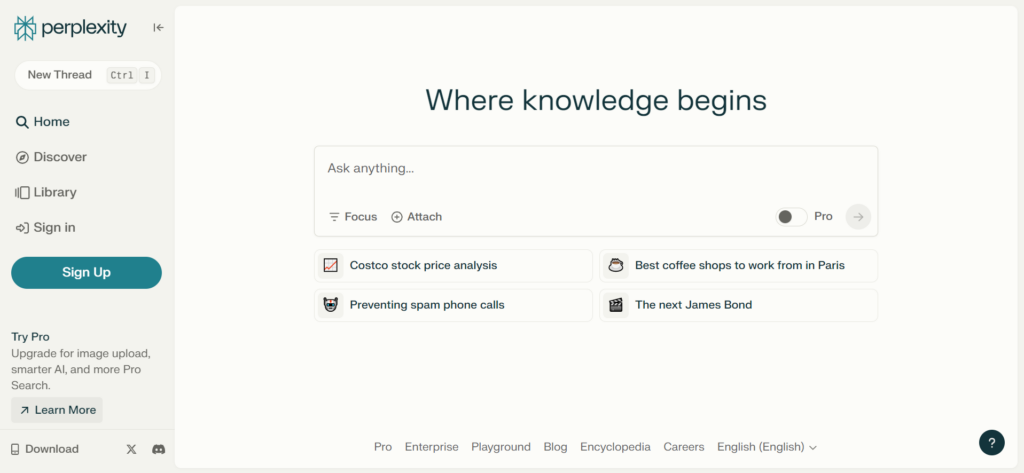
- Live Search Simplification – Perplexity simplifies the core concept of live search by providing concise answers instead of a list of search results. This approach saves users from reviewing multiple sources and delivers direct, clear responses.
- Answers Engine – Upon entering a query, Perplexity scours the live internet for resources that can answer the query. It then processes these search results through an AI model to generate concise answers, replacing traditional search result links with informative paragraphs.
- Cited Answers – Each answer generated by Perplexity is accompanied by citations from the source webpages. This feature allows users to use the AI tool for literature review effortlessly, cross-check information and ensure the reliability of the answers provided.
- Pro Search – The Pro Search feature acts like a mindful research assistant, narrowing down search scopes for optimal results. It leverages OpenAI’s GPT-3.5 model to process search data and deliver concise answers. Subscribers to Perplexity Pro can rewrite answers using different models, such as GPT-4, Claude 2.1, or Mistral Large, providing flexibility in the quality and style of responses.
- Answer Rewriting – Under every answer, there is a rewrite option for Pro subscribers. This allows users to refine or change the answer using a different AI model, enhancing the customization and accuracy of the information.
- Collections – Perplexity allows users to group related threads into folders called Collections. This feature is particularly useful for organizing research on specific topics. Users can sort threads, get new thread suggestions, and maintain a structured overview of their research.
- Thread Suggestions – New thread suggestions are provided for each collection, helping users expand their research and explore related topics efficiently. By grouping threads into Collections, users get a comprehensive view of their research topics. This organizational tool helps in quickly locating relevant information and managing extensive research projects effectively.
Perplexity AI – Pros and Cons
Perplexity AI – Pricing Plans
- Free Plan with basic search and summarization capabilities
- Perplexity Pro plan at $20/month or $200/year – Unlocks higher search volume and upgraded Pro Search, and Image Upload
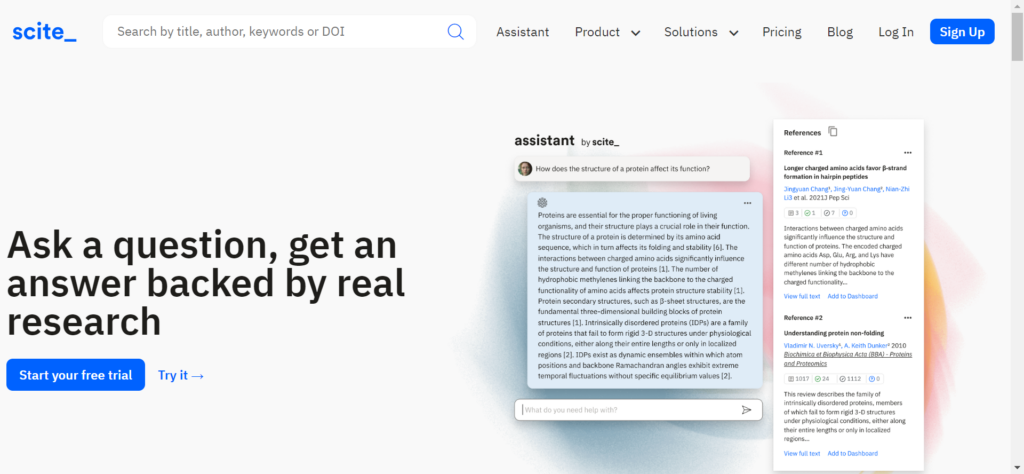
Scite AI is an AI research tool that analyzes over 1.2 billion citation statements from 187 million articles, books, preprints, and datasets offering insights into how publications are cited, indicating whether the citations are supportive or contrasting. Scite AI streamlines research with features like custom dashboards, reference checks, and pre-built journal metrics. The Assistant by Scite enhances research by leveraging large language models to generate AI-powered content for tasks such as literature exploration and decision-making, contributing to more reliable scientific research.
- Smart Citations: This feature provides detailed information about how a paper has been cited, including whether the citations are supporting or contrasting. This helps researchers evaluate the credibility and impact of scholarly articles more effectively.
- Reference Check: Researchers can upload their research articles to see how the references they are citing have been cited by others. This ensures that they are citing reliable work and helps identify any retracted references.
- Visualizations: Scite’s visualizations allow researchers to discover and evaluate scientific articles through interactive citation networks, making it easier to place a paper in the context of the wider literature.
- Browser Extension: The Scite browser extension for Chrome, Firefox, or Safari allows users to easily see how articles have been cited anywhere they are reading online, providing instant access to a vast amount of relevant information.
- Custom Research Dashboards: Researchers can track emerging citations to trending topics and research areas with custom Scite research dashboards, receiving email alerts when a study gets supported, contrasted, or receives a new editorial notice.
- Integration with ORCID: Scite offers ORCID integration for easy sign-up and syncing of articles, making it easier for researchers to manage their work and track citations.
Scite AI – Pros and Cons
Scite AI – Pricing Plans
Scite AI offers a 7-day free trial and upgrades to individual monthly or yearly plans. It costs $20/month or $105/year and offers access to all Scite AI features, including Smart Citations, Scite Report, and Scite Reference Check.
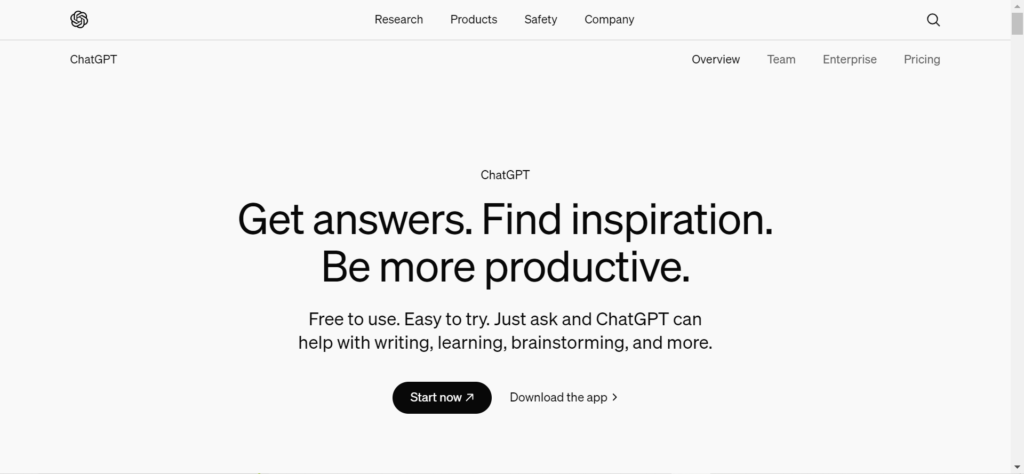
Applications of ChatGPT in Research
- Literature Review: ChatGPT can assist in conducting comprehensive literature reviews by summarizing key findings, identifying significant insights, and providing textual explanations. It can also help in identifying gaps in the literature and suggesting potential research directions.
- Data Analysis: Helps analyze data by generating textual reports, extracting key information, condensing information by rephrasing sentences, removing repetition, and providing compact information. It can also perform statistical analyses and draw out insights and interpretations.
- Research Idea Generation: Generates research ideas by providing suggestions for research methods, ranking them based on their potential effectiveness, and assisting in the development of research designs.
- Validation: Validate research findings by suggesting appropriate validation methods, metrics, or evaluation criteria. It can also assist in integrating validation frameworks into research designs.
- Language Translation and Multilingual Research: Translate text into multiple languages, making it a valuable AI research tool for non-native researchers, researchers working with international collaborators or accessing sources in different languages.
- Personalized Learning and Research Gateways: ChatGPT can summarize information, break down complex concepts, and compile vast information on a range of topics
- Brainstorming and Idea Generation: Helps in brainstorming and idea generation to formulate research questions or identify a new direction in research.
- Editing and Proofreading: ChatGPT can assist in editing and proofreading manuscripts by improving readability and spotting equation-based mistakes.
ChatGPT – Pros and Cons
ChatGPT – Pricing Plans
ChatGPT offers various subscription plans to cater to different needs:
- Free Plan: Provides access to ChatGPT using the GPT-3.5 model at no cost. Ideal for new users to explore ChatGPT’s capabilities. Note that this model is trained on data up to September 2021, so it may lack the latest information.
- ChatGPT Plus ($20/month): This plan includes faster response times and avoids wait times even during peak hours. It also unlocks advanced features such as image generation, interactive tables and charts, and priority access to OpenAI’s latest functionalities.
- ChatGPT Team ($25/month): Includes all features of ChatGPT Plus, with the added ability to create and share custom GPTs within a workspace, along with an admin console for managing the workspace.
- ChatGPT Enterprise (Customized Pricing): Designed for large organizations, this plan includes all features of ChatGPT Team, with unlimited high-speed access to GPT-4, expanded context windows, and enhanced security and administrative controls.
Today, AI tools for research have truly transformed the landscape of academic work. They’re not just fancy tools; they’re your new assistants in the lab or library, helping to streamline your research workflow, craft high-quality academic content, and speed up the journey to submission—all without the stress of missing deadlines. Imagine having a tireless research assistant who never sleeps, constantly helping you stay on top of your game.
But let’s not forget, while you use AI research tools to make your work effortless, it’s essential to keep your academic integrity intact. When you rely on AI tools, make sure to acknowledge their use in your work, and adhere to the guidelines set by your institution or chosen journal to maintain transparency and ethical use. And here’s a big one: don’t use AI research tools to plagiarize. Using AI to steal someone else’s work undermines your credibility and integrity as a researcher.
So, use AI tools responsibly and take your research to the next level, all while you stay true to the core values of academic integrity.
Paperpal is a comprehensive AI writing toolkit that helps students and researchers achieve 2x the writing in half the time. It leverages 21+ years of STM experience and insights from millions of research articles to provide in-depth academic writing, language editing, and submission readiness support to help you write better, faster.
Get accurate academic translations, rewriting support, grammar checks, vocabulary suggestions, and generative AI assistance that delivers human precision at machine speed. Try for free or upgrade to Paperpal Prime starting at US$19 a month to access premium features, including consistency, plagiarism, and 30+ submission readiness checks to help you succeed.
Experience the future of academic writing – Sign up to Paperpal and start writing for free!
Related Reads:
- Grammarly Review – Is Grammarly Worth it? [2024 Update]
- What are Journal Guidelines on Using Generative AI Tools
- QuillBot Review: Features, Pricing, and Free Alternatives
- An Analysis of How Paperpal Outperforms Other AI Writing Tools
How to Write an Abstract in Research Papers (with Examples)
Research funding basics: what should a grant proposal include, you may also like, free demo: revolutionize your research reading with paperpal’s..., introducing paperpal for overleaf: tailored to edit latex..., boost your earnings with paperpal’s newly launched affiliate..., paperpal recognized among best academic writing tools by..., paperpal review: features, pricing, and how to use, editage review: services, pricing and editage plus, 7 best plagiarism checkers in 2024 (compared), innovation and technology in peer review, introducing ai review, paperpal’s new virtual research coach..., how paperpal enhances english writing quality and improves....
Top 10 Best AI Research Assistants in 2025 (Free + Paid)
21 min read
Feeling overwhelmed by the ever-growing ocean of academic literature? Drowning in research papers and struggling to find the information you need? In this guide, we explore the exciting world of AI research assistants, your secret weapon for conquering research challenges.
AI research assistants are intelligent tools that streamline the research process, saving you time and effort. Imagine having a personal research companion by your side, summarizing complex papers, answering your questions, and even explaining tricky concepts.
This guide dives deep into the top 10 AI research assistants available in 2025, exploring their strengths, weaknesses, and pricing options. Whether you're a student swamped with assignments, an academic conducting in-depth studies, or a professional needing to stay up-to-date on industry research, there's a perfect AI assistant waiting to transform your research experience. So lets get started.
Top 10 AI Research Assistants at a Glance
Best ai research assistant for different fields , key features of elephas for research, elephas pricing , elephas reviews , scispace key features , scispace pricing , scispace reviews , key features of elicit , elicit reviews , chatpdf key features , chatpdf pricing , chatpdf reviews , explain paper key features , explain paper pricing , explain paper reviews , connected papers key features , connected papers pricing , connected papers reviews , lex ai key features , lex ai pricing .
- Lex AI Reviews
Consensus Key Features
Consensus pricing .
- Consensus Reviews
Semantic Scholar Key Features
Semantic scholar pricing , semantic scholar reviews , system key features .
- System Pricing
System Reviews
Consider your research style:, what is an ai research assistant , what are the advantages of using ai research assistants , our selection criteria to pick the top 10 ai research assistants, why elephas is the best ai research assistant .
- Conclusion
- 1. What does an AI research assistant do?
2. What is the best AI research assistant?
3. how can ai assist in research.
Elephas: AI research assistant with multi-AI integration and offline mode for customized writing.
Scispace: It provides in-depth explanations and multilingual support.
Elicit: It excels at literature review and summarization.
Explain Paper: It simplifies complex research papers with customizable explanations.
Connected Papers: Creates a visual map to explore connections between research papers.
Lex AI: It streamlines research writing with formatting and content generation.
Consensus: Delivers evidence-based answers from scientific research with summaries and in-depth analysis.
ChatPDF: It helps in summarizing PDFs, answering questions, and translating languages.
Semantic Scholar: It has a massive paper library, advanced search, and summaries.
System: It provides summaries of relevant scientific literature and visualizations.
1. Elephas

Elephas is an advanced AI research assistant designed to enhance productivity and streamline the research process. This powerful tool integrates seamlessly with your devices, providing context-aware assistance for various tasks. Elephas can summarize content, rewrite text, and interact with multiple platforms, making it an indispensable companion for researchers. With its user-friendly interface and customizable features, Elephas ensures that you can focus on your research while it handles the tedious tasks, saving you valuable time and effort.
Context-Aware AI Assistance: Access Elephas anywhere on your Mac with a simple shortcut, providing custom use cases based on the current screen, such as summarizing YouTube videos or web pages.
Multi-AI Provider Integration: Elephas allows users to leverage multiple AI providers, including Claude, ChatGPT, Gemini , and Groq. This enables customization based on specific writing styles, project requirements, and personal preferences.
Robust Offline Mode: Elephas introduces an offline mode, allowing users to harness AI capabilities without an internet connection, ensuring seamless writing regardless of location.
Integrated Web Search: The enhanced Super Chat feature now includes integrated web search, enabling users to access and incorporate relevant online information directly within the interface.
Smart AI Keyboard: The AI-powered keyboard for iOS devices automates the writing process, offering modes like Professional, Friendly, and Viral to suit different research contexts.
Super Brain Feature: Sync and chat with your personalized AI brains across iOS devices, ensuring your research data is always accessible and organized.
Audio Processing: Record and transcribe audio notes or upload audio files from meetings and podcasts to create comprehensive research brains .
Customisable Snippets and Tones: Define repetitive tasks and set personalized writing styles, allowing Elephas to assist with tasks in a way that matches your unique research needs.

Elephas is one of the best chatgpt apps on the market right now.
It works locally and it's 100% privacy friendly!
If you own a Mac, you should definitely try it out.
2. Scispace

SciSpace Copilot is an innovative AI research assistant who acts as your friendly guide through the challenging world of academic research . It helps you to understand complex topics, and SciSpace Copilot goes beyond summaries. This innovative AI research assistant acts like a friendly study buddy, breaking down complex research papers into easy-to-understand summaries and explanations. It analyzes text, formulas, and data visualizations within research papers, providing clear explanations and answers to your questions in real time.
Breakthrough Comprehension: Copilot goes beyond summaries. It deciphers complex text, equations, and tables, providing clear explanations tailored to your needs. Ask questions directly within your research papers, and receive instant, contextual answers – all without leaving the document.
Multilingual Mastery: Converse with Copilot in 13 languages, including Chinese, Japanese, and French. This removes language barriers and opens doors to a world of scientific knowledge.
Seamless Summarization: Turn mountains of text into manageable molehills. Copilot condenses lengthy sections into concise summaries, allowing you to grasp key points quickly and efficiently. This frees up valuable time for deeper analysis.
Effortless Literature Evaluation: Shortlist relevant papers faster than ever. Pose in-depth questions to Copilot and assess the paper's applicability to your research without relying solely on abstracts.
Personalized Learning Experience: Annotate your research for future reference. Copilot allows you to create your own notes alongside its insightful responses. This personalized learning approach ensures a deeper understanding and streamlines future review.
Premium Plan Starts at $7.79/month
Some reported the tool has been charging without their consent, and they have to cancel their card to stop making payments. The customer support of the tool is not great. Few other users reported that the tool publishes fake articles in the name of well known authors on their site.

3. Elicit

Elicit is a free research tool that helps you find relevant academic papers and gain insights from them. It uses natural language processing to understand your questions and find papers that match your needs, even if they don't use the exact keywords. Elicit summarizes key information and provides helpful metrics to assess paper quality. You can upload your own PDFs and explore them with ease. Elicit is a great way to save time and streamline your research workflow.
Effortless Literature Search: Ask your research question in plain English and Elicit, the AI research assistant, will scour vast academic databases to find relevant publications in a matter of minutes.
Intelligent Paper Summarization: No more sifting through endless papers! Elicit analyzes top results and generates concise summaries highlighting key observations. Gain valuable insights quickly and stay on top of the latest research.
Customizable Research Organization: Tailor your research experience. Elicit allows you to filter by study type and personalize how information about each paper is displayed. Organize your findings for efficient analysis and easy reference.
Data-Driven Insights: Gain a deeper understanding of research methods and outcomes. Elicit unveils the datasets used and results measured by different authors, enriching your research perspective.
Elicit Pricing
- It is free to use
Some users have reported that they cannot go back to the homepage once they start the search on the tool. Additionally, if you want to modify your search a little, the previously started papers won't remain and need to be searched for again in order to get their info.

ChatPDF is an innovative web tool that acts like your personal AI research assistant for all things PDF. Forget clunky software and confusing interfaces. ChatPDF lets you chat with your PDFs in plain English, making it a breeze to unlock the information you need. Whether you're a student analyzing research papers, a lawyer reviewing contracts, or a busy professional summarizing reports, ChatPDF streamlines your workflow and saves you valuable time.
Effortless Summarization: Get concise summaries of your PDFs to grasp key points and information quickly.
AI-powered Q&A: Have questions about the document's content? Ask ChatPDF, and it will use its AI capabilities to provide insightful answers.
Multilingual Marvel: ChatPDF breaks down language barriers. Upload PDFs in any language, and it will process and respond in multiple languages for your convenience.
Cited Sources for Credibility: Answers generated by ChatPDF are backed by references to the original PDF, allowing you to easily verify the information and find the source within the document.
Multitasking Made Easy: ChatPDF lets you manage multiple PDFs simultaneously, making research and information gathering a breeze.
Free Plan ( 3 PDFs Daily and 50 Questions Per day )
Premium Plan Starts $5 Per month

5. Explain Paper

Explain Paper is an AI research assistant to simplify and explain those head-scratching concepts. Explain Paper utilizes cutting-edge AI technology to break down dense research papers into easy-to-understand explanations. Simply upload your paper (PDF or URL) and highlight any confusing sections. Explainpaper, your AI research assistant, will analyze the text and provide clear explanations right on the page, eliminating the need to jump between countless websites
Highlight & Explain: Struggling with a specific passage? Highlight it, and Explainpaper will provide a clear explanation using advanced AI.
AI-Powered Insights: Don't get bogged down by technical jargon. Explainpaper leverages sophisticated AI to simplify complex concepts in research papers.
Save for Later: Don't lose track of those valuable explanations! Save your uploaded papers for future reference and revisit them anytime.
Customization is Key: Explainpaper tailors explanations to your needs. Choose the difficulty level, from basic explanations suitable for a 5-year-old to in-depth analyses for experts.
Dive Deeper: Gain a more comprehensive understanding with related resources provided alongside each explanation, allowing you to delve deeper into specific topics.
Premium Plan starts at $12 per month
We couldn’t find any public reviews on the internet about the tool. We suggest readers proceed with caution while using the tool.
6. Connected Papers

Connected Papers is your AI-powered research assistant, designed to revolutionize the way you explore scientific literature. Imagine a vibrant map where each point represents a research paper, and the closer they are, the more the ideas connect. It is a visual playground for researchers to uncover hidden connections and spark groundbreaking discoveries. Also, the size of the map reflects its influence, and connecting lines showcase the thematic bridges between them. That's the magic of Connected Papers!
Visualize the Conversation: Ditch the endless lists! Connected Papers creates a dynamic map of related research, using circles to represent papers and lines to depict their connections.
Beyond Citations: Sure, citations are important, but Connected Papers goes deeper. It analyzes the meaning and ideas within papers, connecting those that share similar concepts – a far richer way to explore your field.
See the Forest and the Trees: Dive into a single paper or explore a broader topic. Connected Papers lets you input multiple starting points, building a comprehensive map that reveals the connections between different research areas.
Explore from Multiple Angles: Dive deeper by feeding Connected Papers with several starting points. It will then craft a unified map, highlighting the relationships between your chosen papers.
Save for Later: Don't lose track of your research journey. Connected Papers lets you save interesting papers and their connections for future reference.
Paid Plan starts at $10 Per month

7. Lex AI

Lex Ai is an AI research assistant who acts like a smart companion by your side, streamlining the research writing process so you can focus on what matters most – groundbreaking discoveries. Lex goes beyond a simple word processor. It's a powerful AI tool trained on a massive dataset to understand the nuances of academic and scientific writing. Whether you're crafting a research paper, grant proposal, or technical report, Lex can significantly boost your productivity.
Effortless Formatting: Say goodbye to tedious formatting! Lex uses simple prompts to handle references, headers, tables, and lists, freeing you to concentrate on your content.
AI-powered Content Generation : Lex can generate relevant and accurate content based on your specific prompts, saving you precious time.
Side-by-Side Comparison: Maintain complete control over your research. Track and compare your input with the AI-generated text to ensure seamless integration and top-notch quality.
Real-time Research Support: No more research roadblocks! Ask Lex quick questions directly within the platform. No need to switch tabs or lose your train of thought.
Intelligent Learning: The more you use Lex, the smarter it gets. As you write, Lex learns your style and preferences, continuously improving the quality of its suggestions.
Free to use
Lex AI Reviews
8. consensus .

Consensus cuts through the noise by delivering evidence-based answers straight from scientific research. This innovative platform leverages the power of artificial intelligence to analyze millions of peer-reviewed papers, providing you with trustworthy, up-to-date findings. Gone are the days of sifting through mountains of unverified sources. Leveraging the power of artificial intelligence, Consensus dives deep into a vast collection of over 200 million scientific papers to surface insights and summaries you can rely on.
Trustworthy Results: Focus on findings, not fluff. Every answer in Consensus is meticulously sourced from credible scientific publications, ensuring the information you receive is dependable and verifiable.
AI-powered Summaries: Consensus utilizes advanced AI to generate concise summaries, saving you valuable time and effort.
AI-Powered Insights: Unleash the power of AI. Consensus utilizes cutting-edge technology to analyze and summarize complex research papers, delivering clear and concise summaries that save you valuable time and effort.
Effortless Navigation: Experience a breeze with Consensus' user-friendly interface. The intuitive design streamlines the search process, allowing you to find the information you need quickly and efficiently.
In-Depth Analysis: Gain a deeper understanding of the "Synthesize" feature. This powerful tool analyzes the top research papers on your topic, providing a comprehensive overview of the key findings.
Premium Plan Starts at $8.99/month
Consensus Reviews
9. semantic scholar .

Semantic Scholar is an AI-powered research assistant. This innovative tool helps researchers of all levels to navigate the vast ocean of academic literature with ease. This AI research assistant helps you to find exactly what you need when you need it. Semantic Scholar boasts a staggering collection of over 207 million scientific papers, meticulously categorized across diverse fields.
Massive Paper Library: Explore over 207 million research papers across various scientific disciplines.
Laser-Focused Search: Refine your research with advanced filters like journals, authors, publication dates, and more.
AI-powered Recommendations: Never miss a relevant study again. Semantic Scholar suggests related papers based on your search, keeping you on the cutting edge of your field.
TLDR Time Savers: Short on time? Semantic Scholar offers concise summaries (think "Too Long; Didn't Read") for millions of papers, allowing you to grasp key concepts quickly.
Organize Your Research: Build a personalized library to store and categorize your favourite papers. Access them from any device and create custom folders for better organization.
10. System

System is an innovative AI research assistant that simplifies the research process, saving you time and effort. System acts as your personal research companion, using advanced AI to understand your queries and deliver insightful summaries of relevant scientific literature. No more sifting through endless papers – System efficiently gathers and synthesizes information, providing you with a clear and concise overview of the latest research in your field.
- Effortless Research: Simply enter your topic and System delivers a fast, up-to-date summary of relevant research, saving you hours of searching.
- Crystal Clear Insights: System doesn't just provide information, it clarifies it. Each summary is accompanied by transparent citations, ensuring you understand the source of the information.
- Always Current: System stays ahead of the curve by constantly refreshing its knowledge base with the latest research from trusted sources.
- Uncover Hidden Connections: System's unique visualization tools help you see the bigger picture, revealing connections and insights you might have missed.
System Pricing
Free: Basic search.
Premium Plans start at $6/month
How to Choose the Right AI Research Assistant for your Day to Day Activities?
AI Research Assistants are powerful tools that can streamline your daily tasks, but with a plethora of options, choosing the right one can be tricky. Here's how to pick the perfect AI research assistant for your specific needs:
Power User: If you juggle various projects and need an all-in-one tool, consider Elephas. It integrates with multiple AI providers, letting you customise writing styles and tackle diverse tasks.
Free Spirit: For those on a budget, Elicit and Lex AI offer valuable features for free. Elicit excels at summarizing and finding relevant papers, while Lex AI assists with academic writing.
Language Learner: Researching in multiple languages? Scispace Copilot provides multilingual support and in-depth explanations, breaking down language barriers.
Decoding Complex Papers: Then try out the Explain Paper tool that excel at simplifying dense concepts.
Need Massive Library: Semantic Scholar has a massive library of 207 Million research papers.
Elephas: Your Customizable Research Powerhouse
Elephas stands out for its versatility and user-friendliness. Its unique features include:
Offline Mode: Work seamlessly without an internet connection.
AI Integration: Choose from multiple AI providers to fit your writing style.
Smart Summarization: Get clear, concise summaries of research papers.
Customisable Snippets: Automate repetitive tasks and personalise writing styles.
While exploring different options, keep Elephas on your radar. This versatile AI assistant acts like a Swiss Army knife for researchers. Need summaries, rewrites, or help with specific writing styles? Elephas has you covered. Plus, its unique offline mode allows you to access AI help anywhere, anytime.
By following these steps and considering Elephas, you'll be well on your way to finding the perfect AI research assistant. Remember, the best research assistant depends on your specific needs and will help you conquer your research challenges, transforming your daily grind into a breeze. Explore free trials and various features to find your ideal solution.
Before we move on to the advantages of research assistants, let's look at what exactly an AI research assistant is.
Think of an AI research assistant as your own personal research librarian on steroids. It saves you time, simplifies complex information, and even explains tricky concepts. It helps you focus on the most important parts of your research.
These are powerful tools powered by artificial intelligence (AI) that help researchers navigate the ever-growing ocean of academic literature. They act like smart companions, helping you with various tasks such as:
Slicing Through Text Mountains: AI assistants can quickly summarize lengthy research papers, saving you hours of reading time.
Finding the Perfect Papers: Struggling to find relevant research? AI assistants can search vast databases to pinpoint studies that align with your topic.
Understanding the Jargon: AI can break down complex concepts and explain them in clear, easy-to-understand language.
Supercharge Your Writing: Some AI assistants can help with academic writing tasks like formatting references and generating content prompts.
Here's the best part: AI research assistants come in all shapes and sizes. Some are free to use, while others offer paid plans with more advanced features.
Who can benefit from an AI research assistant?
Students swamped with research papers
Academics conducting in-depth studies
Professionals need to stay up-to-date on industry research
Research can feel like quicksand sometimes - the more you struggle, the deeper you sink. But what if there was a helpful tool to pull you out? That's where AI research assistants come in!
So, what exactly can these AI helpers do?
Save Time & Effort: AI assistants can summarize research papers, find relevant articles, and even answer your questions about them. This frees you up to focus on the important stuff - understanding the research and making cool discoveries!
Understand Complex Concepts: AI can break down tough research papers into easy-to-grasp chunks. No more head-scratching over confusing jargon!
Write Like a Pro: Some AI assistants can even help you write your research papers or reports. They can suggest citations, improve formatting, and even rephrase sentences for better clarity.
Stay Organized: Keep track of all your research in one place! Some AI assistants let you store and organize your findings, making it easy to find what you need later.
Work Offline: No internet connection? No problem! Some AI assistants work even without wifi such as Elephas, so you can keep researching on the go.
More Efficient Workflow: Organize your research materials and streamline the process.
Less Stress: Free up mental space by letting AI handle repetitive tasks.
Write Smarter, Not Harder: From suggesting citations to helping with formatting, AI assistants can streamline your academic writing, making it faster and more efficient.
Basically, AI research assistants are like having a personal research buddy who can:
Save you time and effort
Boost your research productivity
Make research less stressful and more enjoyable
Picking the perfect AI research assistant can feel overwhelming. But fret no more! Here's a peek behind the curtain at how we select the AI assistants to bring you the top 10 list.
Accuracy is King: We prioritize assistants with an impressive track record of delivering accurate information and completing tasks flawlessly. Imagine a research partner that gets your facts straight every time!
Knowledge Powerhouse: The best assistants boast vast knowledge bases, able to answer your questions on nearly any topic. Whether it's obscure historical details or cutting-edge science, a top contender will have it covered.
Understanding Your Needs: We value assistants that can decipher your intent and respond accordingly. Imagine an assistant that anticipates what kind of information you need, saving you tons of time and effort.
Multilingual Mastery: Research shouldn't have language barriers! Top assistants can understand and respond in multiple languages, making them ideal for global research projects.
We also looked into the Reputation and Reliability of each Tool:
User Reviews and Ratings: What do actual researchers have to say about the assistant's effectiveness?
Data Source Credibility: Does the assistant rely on trustworthy sources for its information (e.g., peer-reviewed journals)?
Transparency and Explainability: Does it provide clear explanations for its findings and avoid presenting AI-generated content as absolute truth?
By applying these stringent criteria, we've curated a diverse selection of AI research assistants, each catering to specific research needs and budgets. From the comprehensive summaries of Elephas to the visual exploration offered by Connected Papers, there's a perfect companion waiting to transform your research experience.
Conclusion
Choosing the right AI research assistant depends on your specific needs and research style. If you're a busy researcher juggling multiple projects, consider Elephas, a versatile tool with features like multi-AI integration, customizable writing styles, and an offline mode. For those on a budget, free options like Elicit and Lex AI offer valuable functionalities.
No matter your needs, there's an AI research assistant waiting to transform your research experience. Explore free trials and different features to find your perfect match. Elephas stands out for its comprehensive features and customizability, making it a powerful companion for researchers of all levels. Try out Elephas today and see how AI can supercharge your research journey!
1. Wha t does an AI research assistant do?
An AI research assistant tackles tedious tasks like summarizing complex papers, finding relevant articles through vast databases, and even explaining mind-bending scientific jargon in clear language. This frees you up to focus on the analysis and discovery that make research exciting.
While several AI research assistants offer valuable features, Elephas stands out for its versatility and customizability. Elephas integrates with various AI providers, letting you tailor writing styles to your needs. It can even work offline, making it a reliable companion wherever research takes you.
AI research assistants are like supercharged research partners. They can slash through time spent summarizing lengthy papers and pinpoint the most relevant studies from massive databases. AI can break them down into clear explanations. Some AI assistants can even help with formatting and citations.
AI assistant
Personal Knowledge Management
Sign up now
Get a deep dive into the most important AI story of the week. Deliverd to your inbox for free!
Meet Elephas - Your AI-Powered Knowledge Assistant. Your Personal ChatGPT for all your files. Transform information overload into actionable insights. Organize vast knowledge. Access ideas efortlessly. Save 10 hours a week
You may also want to read

The ChatGPT Name Game: Why Won't AI Say "David Mayer"?
Pinned Post
Interview with Elephas Founder Kamban S | Safety Detectives

Top 10 Best AI Tools for Coaches (Free + Paid) in 2025
Previous Post
NEW YEAR DEAL: Get 6 months free on all Annual Plans (50% off).
Bulk Content Generator
Brand Voice
AI Text Editor
Top AI Tools for Academic Research

Founder, Junia AI

Introduction
Academic research , once a tedious process involving hours spent in libraries and manual data collection, is now increasingly digitized. Technological advancements have made this critical aspect of knowledge generation more efficient and accessible.
One visionary who foresaw this transformation is Bill Gates . Known for his insightful predictions, Gates anticipated that AI-driven software would revolutionize education and academia within a span of 5-10 years. And true to his words, we are witnessing a surge in the use of AI writing tools for academic research.
These AI tools are not just augmenting traditional research methods but are reshaping them altogether. They offer a myriad of benefits like accelerating the pace of research, enhancing accuracy, and democratizing access to academic resources.
In this article, we have compiled a list of the top AI writing tools for academic research. These tools employ natural language processing algorithms to assist researchers in various aspects of the research process, including:
- Generating ideas and outlining papers
- Finding relevant sources
- Proofreading and editing
Best AI Tools For Research: Our Top Picks
thout reading entire text and establishes relationships between concepts across documents. | | 5 | Scite.ai | Analyzes citation patterns in scholarly articles to assess impact/credibility of papers. Categorizes citations as supporting/mentioning/disputing original paper's claims/findings. | | 6 | Research Rabbit | Web app for scientific literature exploration/understanding. Creates organized collections of relevant papers using advanced algorithms analyzing content/metadata (keywords/abstracts/citation networks). | | 7 | Google Scholar | Extensive online repository of scholarly literature across disciplines. Uses AI algorithms to rank documents by relevance and tracks citations to measure impact. | | 8 | Trinka | Improves academic papers' quality by providing feedback on sentence structure, vocabulary usage, overall coherence. |
1. Junia AI
.png?token=eyJhbGciOiJIUzI1NiIsInR5cCI6IkpXVCJ9.eyJ1cmwiOiJ1c2VyLWdlbmVyYXRlZC1pbWFnZXMvZjJmOThkNWUtNjNjNC00MTJiLTkyY2QtZjgyNDI5NTE3YWRkL1NjcmVlbnNob3QgMjAyMy0xMi0xNiBhdCAyMi4yMi40MCAoMSkucG5nIiwiaWF0IjoxNzA5OTM1NzUyLCJleHAiOjIwMjUyOTU3NTJ9.mwSsgMw94c8_U1XaTjDalxtKua8hNbQscZGif0iyTAE)
Junia AI is a leading AI writing tool for academic research, and its citation generator feature is one of its standout offerings. With Junia AI, citing research sources becomes a breeze, saving you time and effort. Let's take a closer look at what makes Junia AI the go-to citation tool for researchers and academicians.
How Junia AI Works
Junia AI utilizes advanced algorithms to simplify the citation process. It has access to a vast database of sources, which allows it to generate accurate citations in various styles such as APA, MLA, and Chicago. Here's how it works:
- Input Source Details: You provide the necessary information about your source, such as author name, publication title, year of publication, etc.
- Select Citation Style: You choose the desired citation style from the available options.
- Generate Citations: Junia AI applies its algorithms to create citations based on the provided details and selected style.
Key Benefits of Using Junia AI
Using Junia AI for your citation needs offers several advantages that can enhance your research process:
1. Time Efficiency
Manually citing sources and formatting reference lists can be time-consuming, especially when dealing with multiple styles. With Junia AI, you can save valuable time by letting the tool handle these tasks for you.
2. Accuracy
Correctly citing your sources is crucial in academic writing as it adds credibility to your work and prevents plagiarism issues. Junia AI's advanced algorithms ensure that your citations are precise and consistent with the chosen style.
3. Ease of Use
Despite its sophisticated features, Junia AI remains user-friendly. Its intuitive interface makes it easy to enter source details, and its ability to generate citations instantly is a boon for researchers working under tight deadlines.
4. Versatility
Whether you're citing a book, a scholarly journal, a website, or any other type of source, Junia AI has got you covered. It supports a wide range of source formats, making it a versatile tool for all your citation requirements.
While Junia AI offers significant benefits for academic writing, it's worth noting that there are other AI-driven tools available to assist you throughout your research journey.
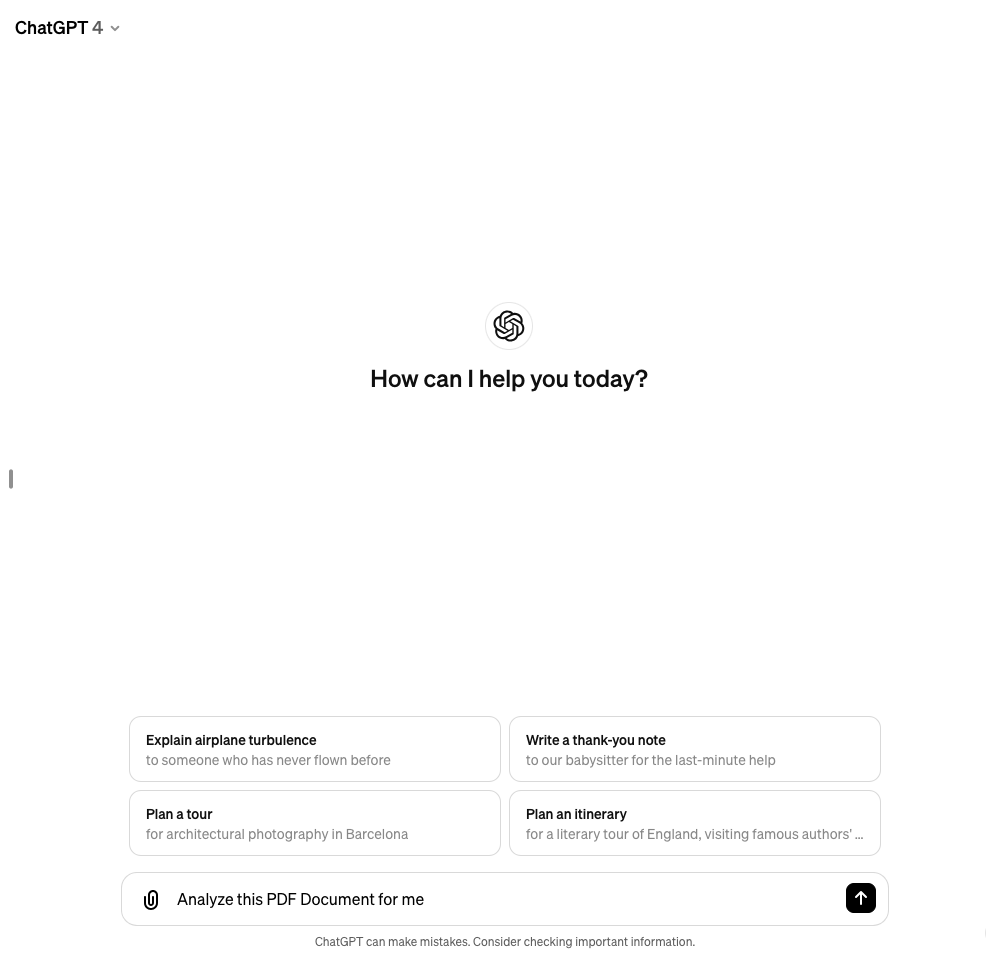
ChatGPT , developed by OpenAI , is an essential tool for academic research. This language model is specifically designed for generating text, making it a valuable assistant for scholars and researchers.
The Power of Incremental Prompting
The key feature of ChatGPT that resonates with academia is its incremental prompting feature. Incremental prompting allows researchers to create detailed outlines for their journal articles or research papers. With this feature, you can provide the model with a series of related prompts one by one, and it will respond accordingly. This step-by-step approach leads to more coherent and detailed responses.
This capability not only simplifies the writing process but also makes it more structured and organized. It's like having an intelligent assistant that helps you arrange your thoughts and ideas into well-defined sections or chapters of the research document.
Versatility in Document Handling
One of the strengths of ChatGPT lies in its ability to work with different types of documents. It can browse the web, interact with files (including PDFs and other formats), making it convenient for users to access various sources during their research work.
This ability is particularly useful when dealing with large PDF files or complex documents where finding relevant information can be challenging. With ChatGPT, you can simply upload your file, ask specific questions about its content, and get precise answers instead of having to read through the entire document.
Case Study: Stanford University
Let's look at an example from Stanford University where ChatGPT was tested by students and professors . They used this AI tool as part of their academic writing process - from generating ideas to creating outlines for journal articles.
- In one instance, a PhD student working on a paper about AI ethics used ChatGPT to generate an outline for his document. He started with a broad prompt on AI ethics which yielded a general response from the model. He then gradually added more specific prompts, leading the model to generate a detailed and organized outline of the paper.
- In another case, a professor at Stanford used ChatGPT for preparing his lectures. He would prompt the model with a topic he planned to teach and based on the generated responses, he would create an outline for his lecture.
These real-life examples demonstrate the effectiveness of ChatGPT in academic writing. It's not just about easing the writing process but also enhancing it by providing a new way to structure your thoughts, ideas, and findings. As Bill Gates predicted, AI-driven software like ChatGPT is indeed revolutionizing education and academia.
From these examples and many more, it is clear that using an AI tool like ChatGPT can significantly improve the academic writing process. By providing structure to your work, generating ideas, and making information retrieval easier, such tools are proving to be game-changers in academic research.
3. Consensus
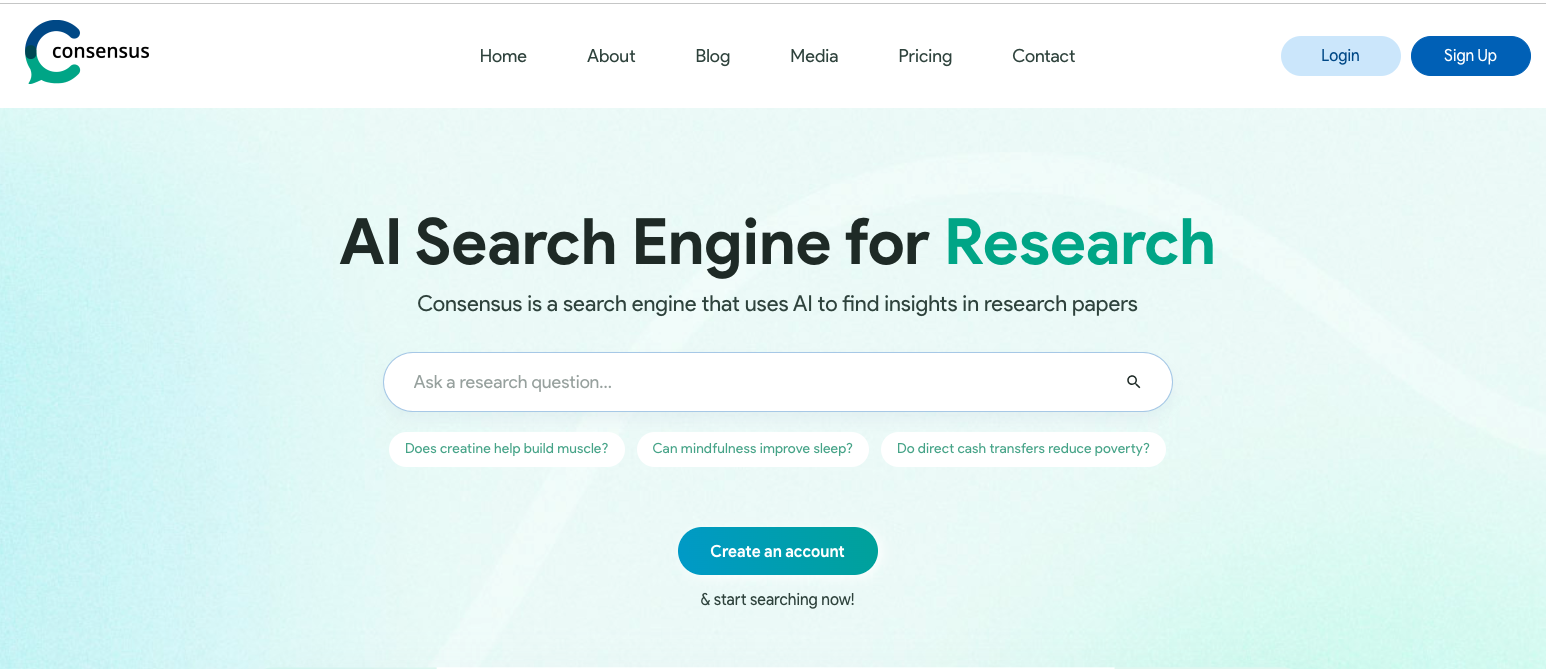
Consensus is a specialized search engine designed for academics, leveraging advanced Artificial Intelligence to provide accurate and concise summaries of peer-reviewed articles.
How Consensus Works
The power of Consensus lies in its AI algorithms, which analyze the content of papers to extract key information. This makes it more than just a regular search engine - it's a tool that can distill complex academic papers into easy-to-understand summaries.
Why Choose Consensus?
When it comes to finding relevant sources for your research, Consensus offers several advantages over traditional search engines:
Features of Consensus
- Summarized Evidence : Consensus provides summarized evidence from peer-reviewed literature, allowing you to quickly grasp the main points of a paper without reading the entire document.
- AI-Powered Search Engine : Unlike keyword-based search engines, Consensus understands the context and relevance of your query, delivering more precise results.
- User-Friendly Interface : With its simple yet efficient interface, Consensus makes it easy for you to navigate the platform and find what you need.
Benefits of Using Consensus
Using Consensus during the literature review stage of your academic research projects can bring several benefits:
- Efficient Information Retrieval : By providing concise summaries of peer-reviewed articles, Consensus helps you save time during the literature review process.
- Access to Quality Sources : As Consensus focuses on peer-reviewed literature, using it ensures that you're accessing reliable and academically sound sources.
- Time-Saving : Thanks to its AI-powered search engine, Consensus delivers relevant results quickly, allowing you to work more efficiently.
- Improved Understanding : The summarized evidence provided by Consensus can enhance your understanding of the topic at hand, making your research more comprehensive.
- Ease of Use : With its user-friendly interface and straightforward functionality, Consensus is a tool that seamlessly integrates into your academic writing workflow.
Consensus serves as an example of how AI can transform the way academic research is conducted. As we embrace the digital age, tools like Consensus are becoming essential for researchers in various fields. By harnessing the power of AI, Consensus paves the way for more efficient and effective academic research, allowing you to focus on what truly matters - creating impactful knowledge.
4. Elicit.org
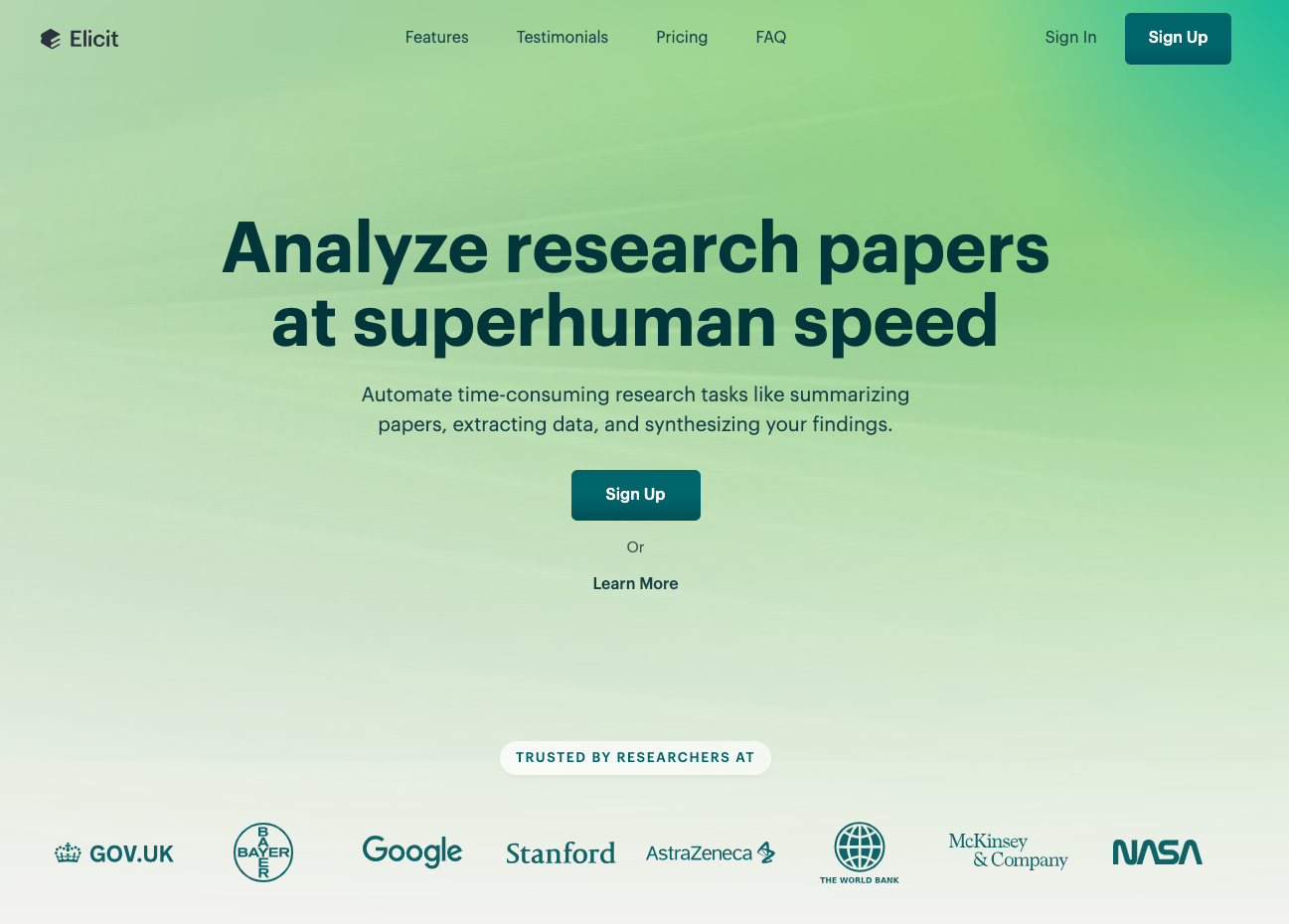
Elicit.org is an AI-powered tool designed to streamline the research process by assisting in conducting comprehensive literature reviews and extracting relevant data from various sources. It is one of the top AI writing tools for academic research that has been embraced by researchers worldwide.
How Elicit.org Works
The power of Elicit lies in its sophisticated algorithms that analyze the content of documents. These algorithms are capable of identifying key concepts, relationships, and findings within a sea of information. This feature allows users to gain valuable insights for their own research projects in a fraction of the time it would take manually.
Key Features of Elicit.org
Identifying key concepts.
Elicit's AI is programmed to identify and highlight key concepts within a text. This gives you an immediate grasp of the main ideas within a document without having to read it in its entirety.
Establishing Relationships
Another significant feature of Elicit.org is its ability to establish relationships between different documents or concepts. This helps to build a comprehensive understanding of the subject matter.
Extracting Findings
Finally, it can extract critical findings from research papers, providing you with specific data points that may be relevant to your research.
The practical applications of these features are numerous. For instance, if you were conducting a literature review on climate change, Elicit.org could:
- Analyze hundreds of papers
- Identify the key concepts such as 'global warming', 'carbon emissions', 'deforestation', etc.
- Establish relationships between these concepts across different papers
- Extract critical data points like specific carbon emission figures.
Try Elicit.org for Your Research
Elicit.org has truly revolutionized the way researchers approach literature review and data extraction, making it a crucial AI tool for academic research. By integrating Elicit.org into your research workflow, you can leverage its AI capabilities to make your research process more efficient and effective.
5. Scite.ai
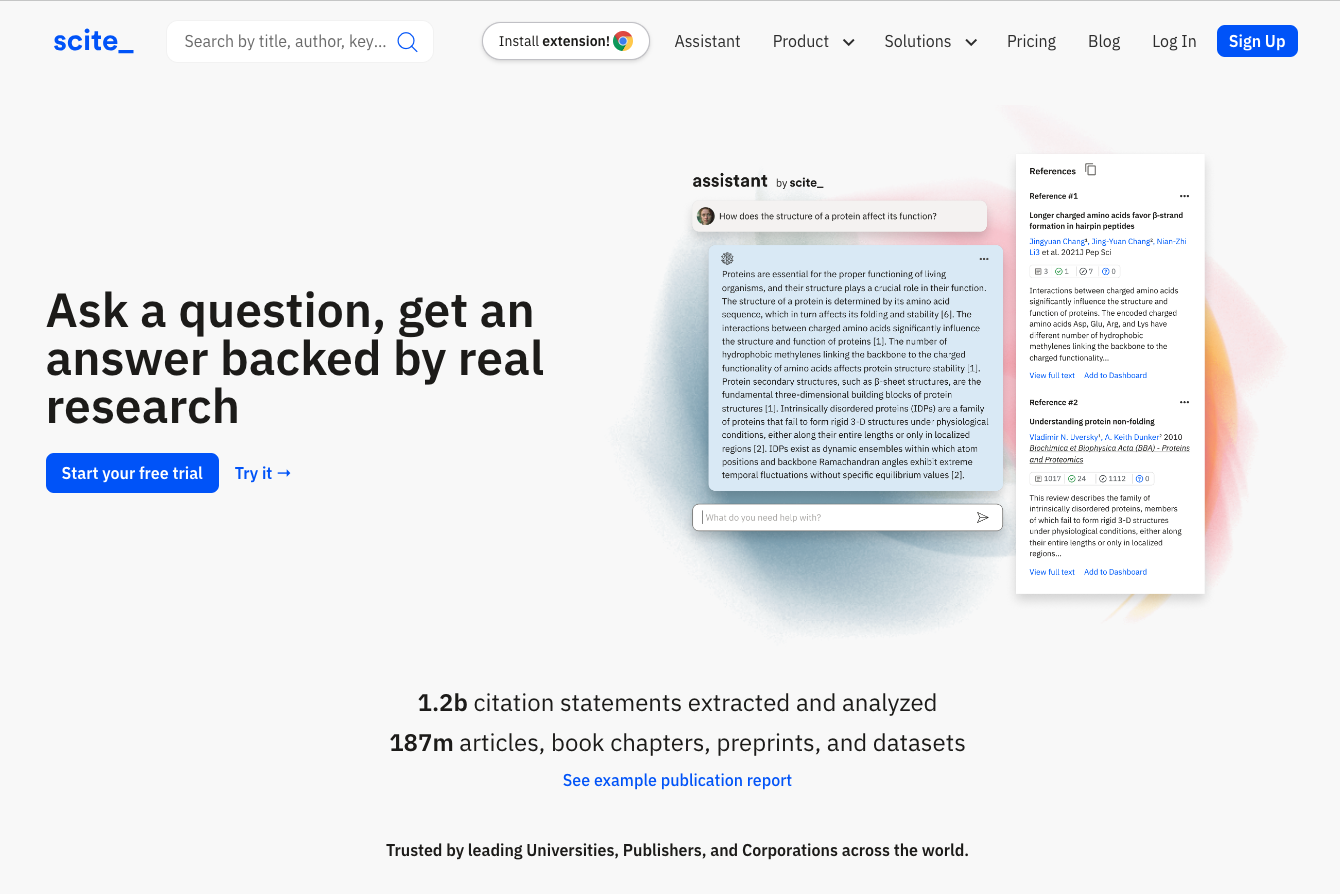
Scite.ai , a unique platform that stands out in its approach to enhancing the credibility of research.
Beyond Traditional Citation Tools
Scite.ai is not just a citation tool; it uses artificial intelligence to analyze citation patterns in scholarly articles meticulously. This insightful analysis offers users contextual information about how particular studies have been cited by other researchers. It's like having an intelligent assistant who can tell you not just who is citing your work, but also how and why they are citing it.
How Does Scite.ai Enhance Research Validation?
The primary focus of Scite.ai is on research validation. This is where the tool truly shines. In simple terms, Scite.ai helps scholars assess the impact and credibility of published papers more effectively. Its underlying AI technology sifts through the multitude of citations associated with any article, cutting through the noise to provide meaningful insights. It uses these insights to determine whether a paper has been positively or negatively received, based on the context within which it has been cited in subsequent works.
But how does this work?
Scite.ai takes each citation and breaks it down into three categories:
- Supporting : The citing work provides evidence in favor of the assertions made in the original paper.
- Mentioning : The citing work refers to the original paper but does not explicitly support or dispute its content.
- Disputing : The citing work challenges or contradicts the findings or claims made in the original paper.
This categorization gives a clear snapshot of how other researchers view your study, which can be invaluable when assessing its impact and validity.
Benefits of Using Scite.ai for Academic Writing
Incorporating Scite.ai into your academic writing process comes with several potential benefits:
- Strengthening Arguments : Knowing how others perceive your references can help you build stronger arguments by choosing sources that have been widely accepted and supported.
- Supporting Claims : Scite.ai gives you an edge by letting you back up your claims with references that have been positively cited in other works.
- Enhancing Credibility : A paper that includes well-regarded sources increases its credibility in the academic community, potentially leading to more citations and higher impact.
Understanding the Context of Citations
Scite.ai's approach to assessing the impact of papers does not stop at categorization. It also provides a 'citation statement', which is a brief excerpt from the citing text. This allows users to understand the context and rationale of the citation without having to read through the entire citing article.
For example, if a researcher is writing about climate change and selects a paper as a reference, Scite.ai not only shows how many times the paper has been cited but also provides an overview of whether these citations are supporting, mentioning or disputing it. This information paints a more in-depth and detailed picture of how the chosen paper has been received by the scientific community.
The Power of Scite.ai for Scholars
In essence, Scite.ai is a powerful ally for any scholar. It provides unique insights into citation patterns, enabling users to make informed decisions about which sources to use and how to present their arguments effectively. The ability to validate research, bolster arguments, and enhance credibility makes Scite.ai an indispensable tool in today's digital age where academic integrity is paramount.
6. Research Rabbit
Research Rabbit is an innovative AI tool designed to assist with exploring and understanding scientific literature. It's a web application that helps researchers navigate through scientific literature, enabling them to create organized collections of pertinent papers.
Utilizing advanced algorithms, Research Rabbit analyzes both content and metadata of articles. The analysis allows the application to suggest related works, providing researchers with new perspectives and connections they might have overlooked.
How Does Research Rabbit Work?
Research Rabbit employs AI algorithms to scrutinize the content and metadata of articles. This process includes evaluating keywords, abstracts, author affiliations, citation networks, and even figures and tables within the paper. This comprehensive approach provides a deeper understanding of the article's context and relevance.
The system then recommends other relevant articles based on its analysis. This feature aids researchers in uncovering new links between studies and gaining interdisciplinary insights.
Benefits of Using Research Rabbit
The use of Research Rabbit can bring multiple benefits to both novice and experienced researchers:
- Keeping Up With Latest Developments : The rapid pace at which new research papers are published makes it challenging for researchers to stay updated. Research Rabbit addresses this issue by providing recommendations based on recent publications related to their chosen topics.
- Identifying Research Gaps : By reviewing related papers suggested by Research Rabbit, researchers can identify gaps in current knowledge and thereby find opportunities for novel research.
- Improving Efficiency : Instead of manually searching for relevant studies, researchers can rely on Research Rabbit's AI-powered suggestions, saving valuable time.
- Enhancing Understanding : By presenting different perspectives on a topic through related works, Research Rabbit fosters a more comprehensive understanding of the subject matter.
To illustrate this process, consider a researcher studying climate change's impact on agriculture. After inputting their research papers into Research Rabbit, the application might suggest articles about innovative farming practices in response to climate change or economic studies on how climate change affects agricultural markets. These suggestions can lead the researcher to consider new angles for their work, promoting a more nuanced and complete analysis.
Research Rabbit represents a significant advancement in AI writing tools for academic research. Its ability to analyze literature and suggest related works enables researchers to delve deeper into their topics, discover new perspectives, and stay abreast of the latest developments in their field. By harnessing this technology, researchers can enhance the depth and breadth of their studies while improving their productivity.
7. Google Scholar
Google Scholar , a well-known platform for academic research, is an extensive online collection of scholarly literature across various fields. It has become an essential tool in the academic world because of its vast collection of research articles, conference papers, theses, books, and patents from professional societies, online repositories, universities, and other scholarly organizations.
Google Scholar uses advanced AI algorithms to rank documents based on their relevance, considering factors such as the full text of each document, where it was published, who authored it, and how frequently and recently it has been cited in other literature. As a result, researchers can access a wide range of scholarly content that might not be available through other search engines.
Finding Relevant Sources with Google Scholar
When doing academic research, the challenge often lies not in finding information but in finding relevant information. By using Google Scholar 's advanced search features effectively, you can overcome this challenge.
General Search
Simply enter your keywords into the search bar for a list of relevant resources.
Advanced Search
Click on the menu icon on the top left of the page and select "Advanced Search" for more specific queries. You can:
- Search for exact phrases
- Exclude certain words
- Search within specific publications or authors
Author Verification
If you're searching for articles from a particular author, make sure that they have verified their Google Scholar profile to avoid confusion with authors having similar names.
Tracking Citations: Measure Your Impact
One of the unique features of Google Scholar is its citation tracking capability. This feature allows researchers to measure the impact and influence of their work within the academic community.
This link under each result shows how many times an article has been cited by other papers indexed on Google Scholar . It's a helpful indicator of an article's influence or importance in a field.
Google Scholar Citations
This feature lets authors track citations to their articles. You can check who is citing your publications, graph citations over time, and compute several citation metrics.
Tips and Strategies: Maximizing Google Scholar's Effectiveness
The value derived from Google Scholar largely depends on how effectively you use its features. Here are some strategies to enhance your academic writing endeavors:
- Refine Your Search : Use boolean operators like AND, OR, NOT, "", and - to narrow or broaden your search.
- Personalized Updates : Set up alerts for new content that matches your specified criteria (such as author or keyword). This helps you stay updated with the latest research in your field of interest.
- Export Citations : Google Scholar allows you to export citations in various formats (like BibTeX, EndNote, RefMan, or RefWorks) which can be directly imported into your reference management software.
Google Scholar is considered one of the most powerful academic search engines available. Its comprehensive database coupled with advanced AI algorithms makes it an invaluable tool for academic research. By understanding its features and learning how to leverage them effectively, you can streamline your academic writing process and produce well-researched scholarly work.
Trinka is an advanced writing assistant powered by AI that aims to improve the quality of academic papers. It provides researchers with valuable feedback and suggestions to refine their writing style and eliminate grammatical errors.
How Does Trinka Help Improve Your Writing?
Trinka uses advanced algorithms to analyze your text thoroughly, focusing on three main areas:
1. Sentence Structure
Trinka examines each sentence in your paper for clarity, coherence, and conciseness. It suggests revisions to make your writing easier to understand.
2. Vocabulary Usage
The tool identifies complex or inappropriate words in your writing and suggests simpler alternatives.
3. Overall Coherence
Trinka evaluates the logical flow of ideas and arguments throughout your paper, highlighting areas that may need further explanation or reorganization.
By addressing these aspects, Trinka helps you create a well-written academic paper with a strong foundation.
"Trinka is more than just a grammar-checking tool. It is a smart companion that understands the nuances of academic writing and can assist you in producing high-quality papers.
The Power of AI Writing Tools for Academic Research
With the rapid advancements in technology, an important shift has taken place in the academic research arena. The emergence of AI writing tools for academic research has become a game-changer, improving both efficiency and quality in research efforts. These tools offer a wide range of capabilities that can help at every stage of the academic writing process.
Adapting to Technological Advancements
The world of academia is changing quickly. Researchers now need to keep up not only with developments in their own fields but also with broader technological trends that could affect their work. This includes embracing advancements like AI, which can greatly enhance research endeavors.
One example of this is Scite.ai . This platform uses AI to analyze citation patterns in scholarly articles, giving users contextual information about how a particular study has been cited by other researchers. This approach to research validation can help scholars better understand the impact and reliability of published papers. By using such tools, researchers can strengthen their arguments and support claims with trustworthy references, thereby improving the credibility of their work.
Experimenting with AI Tools
Innovation is key in academic research. That's why it's crucial for researchers to constantly explore and experiment with new methods and technologies that can enhance their work. This includes trying out various AI writing tools mentioned in this article.
For instance, you might want to consider using Research Rabbit for exploring scientific literature and creating organized collections of relevant papers. Its algorithms analyze the content and metadata of articles to suggest related works, enabling you to discover new connections and interdisciplinary perspectives. Such tools not only streamline your literature review process but also inspire new research directions.
The Future is Here
These AI writing tools are not just about keeping up with technological advancements; they are about embracing the future of academic research. As researchers, it's important for us to adapt and evolve alongside these changes, integrating technology into our workflows to improve efficiency and enhance the quality of our work.

IMAGES
COMMENTS
Limitations of AI Tools for Research. Many of the best AI tools for research suit different types of people, and these tools have streamlined tasks and uncovered connections. However, they still have many limitations compared to manual research processes. Here's a closer look at the limitations of AI Research Tools. 1.
AI for scientific writing and research papers. In the ever-evolving realm of academic research, AI tools are increasingly taking center stage. Enter Paper Wizard, Jenny.AI, and Wisio - these groundbreaking platforms are set to revolutionize the way we approach scientific writing.
Check out Sourcely for AI-based source finding and Yomu for AI-enhanced writing editor for students. Disclaimer I am co-creator of both, but we have 10k+ users on both platforms enjoying and finding actual use from both tools
As we look ahead to end of 2024 and forward to 2025, AI tools are set to revolutionize research paper writing by offering powerful features to enhance structure, clarity, and originality. This article explores the top 10 AI writing assistants designed to simplify the research paper writing process for students and academics: Yomu AI. Scite.ai ...
SciSpace is the best AI tool for writing research papers in 2024. It has a plethora of AI tools geared towards locating relevant papers, conducting literature reviews, and finessing your research writing. 4.What are the pros and cons of using AI tools for academic writing? Pros include time efficiency, language precision, heuristic support, and ...
AI-powered tools provide a holistic approach to academic research, enabling efficient note-taking, idea generation, and effective writing. Dr. Fei-Fei Li's assertion that "AI transforms how we approach problems, making data analysis faster, more accurate, and more insightful than ever before" underlines the significant role of AI tools in ...
2. Genei. Best for Summarizing ($15.99/month). Genei has established itself as a prominent player in the realm of academic AI tools, and rightfully so. As a comprehensive tool designed for academics, Genei goes beyond assisting with workflow organization and document storage—it also offers a plethora of features tailored specifically for academic writing.
Find the best AI tools for research that streamline your workflow and support advanced academic research. Maximize your research potential with AI tools that automate complex tasks and enhance your research productivity. ... Paperpal is an all-in-one AI research and writing assistant that helps you edit, write, search, cite and submit with ...
Top 10 AI Research Assistants at a Glance . Elephas: AI research assistant with multi-AI integration and offline mode for customized writing. Scispace: It provides in-depth explanations and multilingual support. Elicit: It excels at literature review and summarization. Explain Paper: It simplifies complex research papers with customizable explanations. ...
Introduction. Academic research, once a tedious process involving hours spent in libraries and manual data collection, is now increasingly digitized.Technological advancements have made this critical aspect of knowledge generation more efficient and accessible. One visionary who foresaw this transformation is Bill Gates.Known for his insightful predictions, Gates anticipated that AI-driven ...